#but seeing people say they want a character to have no narrative purpose stinks
Text
Please Stop, It's Already Dead
We’re almost a year into Zeb Wells’ run on Spider-Man and we finally got answer as to what the f*ck i going on. The mystery box has been opened and it’s full of f*cking stupid. Stupid, stupid, answers. Answers that just don’t work for the characters that we all know and love. Bro, like, i had a whole goddamn essay written about this, about how Zeb Wells has literally thrown out decades of growth and characterization for some half-hearted shock plot to basically troll the fandom but then i saw the leaks for issue twenty-six and what the f*ck? The death of Ms. Marvel? Really? You’re about to fridge Kamala Khan? Word? The most popular and visible Muslim character in f*cking comics, and you’re going to kill her off just to f*ck with Peter Parker even more than he’s already been f*cked over? What the f*ck is even going on anymore? What are you doing Marvel? How is this a good idea? How are these the optics you wan for your flagship comic book and most profitable hero? It’s like you hate money right now.
Listen, I'll be the first to admit that i didn’t care for Kamala when she was first introduced in the comics. Ma came about during the whole “All New, All Different” debacle and i just couldn’t stand any of that sh*t. It didn’t help that she was pushed so goddamn hard, to the point of sheer annoyance. I couldn’t pick up a Marvel comic without a f*cking Ms. Marvel mention for, like, two whole years. It was obnoxious how prominent this chick was in comics but, as time went on, i got over it. Kamala is a thing. I’m good with that. It helps that she is unapologetically Pakistani and Muslim. That sh*t is f*cking dope and we can always have more represenation like that. Then she got a show. Yo, Iman Vellani did the impossible and changed my opinion of Kamla altogether.That was top-tier, RDJ-as-Iron Man casing right there. I am still wildly indifferent to Kamala in the books but Ms. Marvel in the MCU is the sh*t. It’s a crime more people didn’t watch that show but i think she’ll steal all of her scenes in the upcoming Marvels flick. Which, coincidentally, is also written by Zeb f*cking Wells so that might end up being a sh*tshow, too. which brings me back to my point: Why the f*ck are we fridging Miss Marvel in the goddamn first place?
Ma is poised o be a breakout star of one of the most anticipated (some would also say infamous) MCU entries to date. What the f*ck is the motivation behind such an ill-advised comic book death? Now, unlike a lot of people out there in the blogsphere, i don’t think this is desperate and lazy “plot twist” is racist or sexist. I can definitely see why people would say that but this, to me, stinks of corporate mandate. This is the Marvel suits making the call, probably to get buzz going for the aforementioned Marvels film because, so far, word is that thing is a goddamn mess. Which isn’t surprising considering that Wells wrote that thing, too. I Just want to hammer that fact home: Zeb Wells wrote the Marvels and is now killing off Ms. Marvel in the comics, for reasons. You would think it be counter-intuitive to kill off a third of your leads in said flick just for hate clicks but you know the old adage; All publicity is good publicity. I don’t think Marvel as a whole, needs anymore bad publicity, though, and this sh*t is the worst kind.
Wells isn’t even killing her off in her own book, man. Kamala Khan’s death, as temporary as it will probably end up being, is just to give “development” to Peter Parker. Her death is a f*cking plot device, devoid of purpose or narrative weight, and that is the greatest crime being committed here. Bad writing aside, do you know how disrespectful this is to the character? How condescending it is to her fans? It’s wild to me that the higher ups gave the green light for this bullsh*t but, i mean, they did hand Wells the reins to the most popular superhero in the world. And continue to let him f*ck it up. Why not throw a little brown girl sacrifice on the dumpster fire, too? Like, it keeps getting worse and I don't know how that's even f*cking possible. How is this Spider-Man run so bad? How does Wells keep making the absolute wrong choices? I don't even understand how someone who calls themselves a professional writer, can craft such an abysmal narrative and put their name on it. Proudly. You should hear this asshole in interviews. HE rally thinks he’s doing something great with this book right now. The delusion and hubris is real. It’s sh*t like this that’s letting manga absolutely massacre the US comics industry.

4 notes
·
View notes
Text
Please Stop, It's Already Dead
We’re almost a year into Zeb Wells’ run on Spider-Man and we finally got answer as to what the f*ck i going on. The mystery box has been opened and it’s full of f*cking stupid. Stupid, stupid, answers. Answers that just don’t work for the characters that we all know and love. Bro, like, i had a whole goddamn essay written about this, about how Zeb Wells has literally thrown out decades of growth and characterization for some half-hearted shock plot to basically troll the fandom but then i saw the leaks for issue twenty-six and what the f*ck? The death of Ms. Marvel? Really? You’re about to fridge Kamala Khan? Word? The most popular and visible Muslim character in f*cking comics, and you’re going to kill her off just to f*ck with Peter Parker even more than he’s already been f*cked over? What the f*ck is even going on anymore? What are you doing Marvel? How is this a good idea? How are these the optics you wan for your flagship comic book and most profitable hero? It’s like you hate money right now.
Listen, I'll be the first to admit that i didn’t care for Kamala when she was first introduced in the comics. Ma came about during the whole “All New, All Different” debacle and i just couldn’t stand any of that sh*t. It didn’t help that she was pushed so goddamn hard, to the point of sheer annoyance. I couldn’t pick up a Marvel comic without a f*cking Ms. Marvel mention for, like, two whole years. It was obnoxious how prominent this chick was in comics but, as time went on, i got over it. Kamala is a thing. I’m good with that. It helps that she is unapologetically Pakistani and Muslim. That sh*t is f*cking dope and we can always have more represenation like that. Then she got a show. Yo, Iman Vellani did the impossible and changed my opinion of Kamla altogether.That was top-tier, RDJ-as-Iron Man casing right there. I am still wildly indifferent to Kamala in the books but Ms. Marvel in the MCU is the sh*t. It’s a crime more people didn’t watch that show but i think she’ll steal all of her scenes in the upcoming Marvels flick. Which, coincidentally, is also written by Zeb f*cking Wells so that might end up being a sh*tshow, too. which brings me back to my point: Why the f*ck are we fridging Miss Marvel in the goddamn first place?
Ma is poised o be a breakout star of one of the most anticipated (some would also say infamous) MCU entries to date. What the f*ck is the motivation behind such an ill-advised comic book death? Now, unlike a lot of people out there in the blogsphere, i don’t think this is desperate and lazy “plot twist” is racist or sexist. I can definitely see why people would say that but this, to me, stinks of corporate mandate. This is the Marvel suits making the call, probably to get buzz going for the aforementioned Marvels film because, so far, word is that thing is a goddamn mess. Which isn’t surprising considering that Wells wrote that thing, too. I Just want to hammer that fact home: Zeb Wells wrote the Marvels and is now killing off Ms. Marvel in the comics, for reasons. You would think it be counter-intuitive to kill off a third of your leads in said flick just for hate clicks but you know the old adage; All publicity is good publicity. I don’t think Marvel as a whole, needs anymore bad publicity, though, and this sh*t is the worst kind.
Wells isn’t even killing her off in her own book, man. Kamala Khan’s death, as temporary as it will probably end up being, is just to give “development” to Peter Parker. Her death is a f*cking plot device, devoid of purpose or narrative weight, and that is the greatest crime being committed here. Bad writing aside, do you know how disrespectful this is to the character? How condescending it is to her fans? It’s wild to me that the higher ups gave the green light for this bullsh*t but, i mean, they did hand Wells the reins to the most popular superhero in the world. And continue to let him f*ck it up. Why not throw a little brown girl sacrifice on the dumpster fire, too? Like, it keeps getting worse and I don't know how that's even f*cking possible. How is this Spider-Man run so bad? How does Wells keep making the absolute wrong choices? I don't even understand how someone who calls themselves a professional writer, can craft such an abysmal narrative and put their name on it. Proudly. You should hear this asshole in interviews. HE rally thinks he’s doing something great with this book right now. The delusion and hubris is real. It’s sh*t like this that’s letting manga absolutely massacre the US comics industry.

0 notes
Text
Chapter 316: BBQ is capable of critiquing BNHA and… Oh boy.
Let's start this off properly, Horikoshi's typical quality of writing has been diminishing in recent chapters, but this week it was so different that it didn't even feel like Horikoshi was the one who wrote it.
To be clear, I'm not blaming Horikoshi for the issues I'm about to bring up. The man is criminally overworked, usually doesn't even get the final say in what makes it in the final drafts, and even in his other rough patches he's still produced decent chapters that hold up amongst the grand scheme of things. This feels like something else is going on behind the scenes, and while I have my suspicions on who/what might be the culprit behind it, I choose not to share it at this time because if I name names some people might go off on a crusade, and that's not what I want.
I just want to be clear that I'm not blindly firing off shots in the dark, but despite my frustrations I want to wait to see if this gets resolved down the line, and while I do I can complain about the specific reasons this chapter left such a bitter taste in my mouth.
Buckle up, buttercups, because we got a lot of points to cover.
Where's the Gun?
Not a literal gun, but I mean Chekhov's Gun. It has always been a staple of Horikoshi's writing and the reason so many of his long-standing plot lines have paid off so well.
Chekhov's Gun is a writing principal that if you see a gun on the table in the first act of a play, it will be used in the murder that happens in act 2. Basically, the author should include details that are relevant to the story and not betray the audience by leading them in one direction and at the last minute pull the rug out from underneath them to go in another direction.
Horikoshi has done this to phenomenal success in the past. Just as one example, he dropped hints about Nomu being human experiments early in the series but held off explicitly stating it for a while. He hinted at the loss of Shirakumo in the main narrative and that he was important to Aizawa and Mic as well as approved it for Vigilantes so when it was revealed that Kurogiri was Shirakumo's body, not only did it narratively make sense but it also pulled in Eraserhead and Present Mic's emotional stakes into the battle with the Doctor, and then when Ujiko reveals he was after Aizawa's quirk the whole time it made the payoff for Mic punching him in the face all that much better and brings the weight of his crimes and the impact they have on the victims full circle.
That's 3 different guns paying off in the long run: the Nomu, Shirakumo, and both Mic and Eraserheads' personal arcs past the loss of their childhood friend and that they could finally finish processing their grief and avenge him in full righteous fury instead of chalking it all up to cruel chance.
He has left details, some particularly innocuously, in plot lines like the Touya Todoroki reveal, Hawks' backstory, Shigaraki's blood connection to Nana Shimura, even with Mr. Compress's backstory, and more. When re-read, these details become more obvious and usually leaves us with a greater sense of satisfaction in the plot knowing that twists and turns were not only planned, but built up to and hinted at for us to find so the payoff is that much better and it feels purposeful instead of just shock factor.
None of that happened this chapter.
Lady Nagant has zero business being in this plotline. She was never hinted about before this arc, and her existence does nothing to tell us about the plot moving forward or the world that they're trying to change. Nothing her existence provides actually has any bearing on the universe or tells us anything we don't already know. But that's not how she was presented.
In the beginning we're given a glimpse of her helping Overhaul escape from Tartarus. The focus on her was odd enough to begin with as a new character, and the fact that she didn't look like she fit the profile of someone who belonged in Tartarus was like a flashing neon sign saying, "Pay attention! This new character is important!!!" She then shows up later with Overhaul in hand to attack Deku out of the blue. We get her talking about how she thought Overhaul might be useful and her disillusions with Hero Society. We catch her mannerisms with eery similarity to Hawks only to find out immediately after she was a senior colleague in the HPSC. Never once to my knowledge has Hawks referred to any of his senior colleagues as a "senpai" - not even his fellow heroes - and when he catches her in midair, he uses the words, "Don't die on me, senpai!" as if she's near and dear to his heart.
The entire character arc is set up for her to have known about Hawks and grapple with her desire to help people and her fear of re-creating what she hated, and this also set up Hawks to be the successor who succeeded where she failed and helped bring her to a place where she could be a hero without guilt again. What actually happened?
They're strangers.
They have never actually met before, and while he seems to know a lot about her, she doesn't even seem to have any idea of who he was - at least as far as being another hero under the thumb of the HPSC. So ALLLL that setup, all that gesturing, and all of the potential themes that would be right at home in an arc like this goes completely out the window.
Her story doesn't tell us anything new. The HPSC bad. We knew that. They're not above throwing innocents under the bus to achieve that goal. We knew that. They preyed upon young hopefuls with powerful quirks with the intent to maintain the status quo. We knew that even if the fact that Hawks isn't the only one now makes more questions than answers. We know that these young heroes can never say no under threat of steep, life-shattering consequences. We knew that already.
So what does Lady Nagant even bring to the table?! The entire "you're just a puppet doing what you've been told" angle is a little tired and out of place in this point and time with actual anarchy in the streets (not to mention hypocritical considering she was a blind puppet following orders and offers zero actual solutions that supposedly fall in line with her heroic nature), and it could have been left to any number of other villain characters who could have executed on the theme better - you know, like Shigaraki who's justification this entire time has been, "hero society doesn't make people safe, it just makes them feel safe" from the moment of his inception.
So from that angle she's unnecessary.
Her presence messes with the continuity of the series as well. If Hawks is supposed to explicitly replace her, that would mean that he wasn't just a fluke find on the commission's part and grabbed to mold into their own special superweapon; and that also would mean that her killing of the former president was before he was discovered which should put her at least in her forties. If this isn't the case, and he was meant to simply replace her in a "special agent" case, that still begs the question of how many more gifted children the commission preyed upon and are still out there.
And maybe the worst kicker for me is that something stinks. The way the art in this chapter is presented, if you completely blanked out the speech bubbles, is the same setup I had before - Hawks reaches out to his former mentor and pulls her from the brink of despair with a moving message about why he never gave up hope in being a hero who could actually make a difference.
Again, this is not what we got. He claims he knows her, and it's implied to have been a deep, personal character witness; but at best he only knows about her from secondhand sources. Even his reasoning as to how he never lost hope doesn't vibe with his character.
We have gotten so many cool one-liners for Hawks, but there has always been a consistent tone and imagery with them.
"Those who can fly, should."
"I don't belong in a cage."
"I'm free of my shackles."
"Can I be a shining light, just like him?"
What we got was, "I'm an optimist to a fault" which was the wording the official release went with and was by far the best iteration I have seen, but even this falls short of being truly in character for him and answering her question properly.
@mikeana made an edit of the titular panels for us Hawks stans this week with dialogue we and a few other friends felt was more fitting not only with the imagery of the chapter itself but internally consistent with the specific expressions Hawks uses in his heartfelt, personal dialogue. I just tweaked it a little bit more to fit what I was going for in our original conversation.
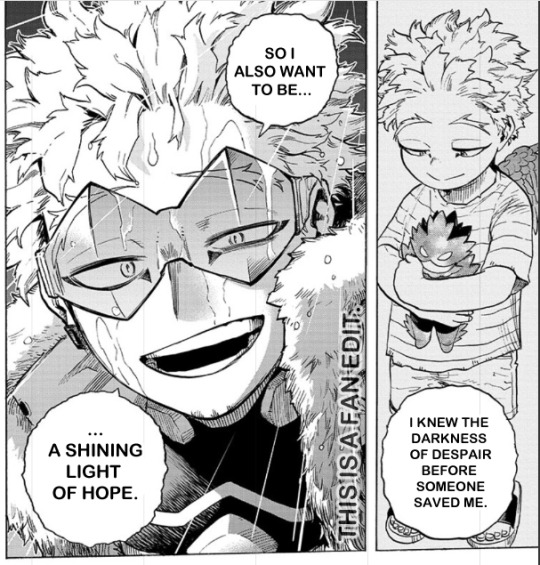
Which brings me to another concern.
2. What's the point?
There was no use for Nagant in the series as she's been presented so far. But more than that, Hawks has no business in this fight to begin with. He literally did nothing to earn this emotional moment, and this should have been Deku's moment.
We were teased in an interview with Horikoshi that Hawks was going to get a special moment as an important end-game character as a "shining light" of hope for others to follow as well as promises for Ochako to have another moment in the spotlight to make a difference.
If this was Hawks' shining light moment, it wasn't necessary, and it does nothing to move the plot forward or develop characters in any true or believable way. It just happened because plot. This should have been Deku's victory through and through, and even he is the reason BOTH Hawks and Nagant made it out alive instead of painting the street below them.
Deku's victory was stolen from him, too. It sours the other promises made to us about other characters moving forward, as well, if this really was Hawks' "Shining Light" moment.
By the way, did you forget about Overhaul? Me too!!! What was the point of getting our hopes up about reintroducing this beloved character with the implications this was a major arc setup to have him scream about pops and then get detained with no clues about what's going to happen to him besides, "Say you're sorry to Eri, and you get to see pops"?!
All this posturing and clumsy narrative flailing only actually succeeded in getting Deku in front of AFO again for plot when we already know Mr. Potato Head could summon, show himself to, or find Deku at any time he wanted. But instead we get this time skip with a bunch of heroes completely mended walking into a big, spooky mansion for AFO to evil monologue at Deku for… *counts*
FOUR PAGES!!!
Only to then give him the "I want YOU!" point over a pre-recorded message and the final nail in the coffin to me that something is off.
3. Ex-pu-LOOOO-SHUN!
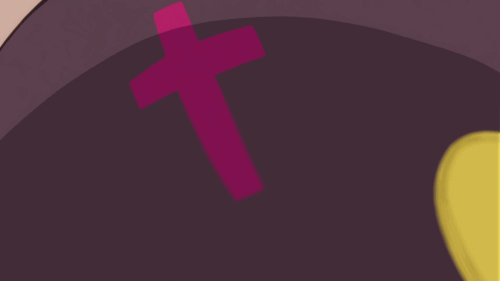
It's become almost a game among friends to count how many explosions have happened since the end of the war arc - and specifically fake-out explosions. In the end of 311 we get All Might's car attacked via explosion and Deku cornered by Nagant only for All Might to be fine in the next chapter. In 315 Lady Nagant herself explodes in a blaze of glory to once again not be dead.
Gee! I wOnDeR if aLl the heroes were AcTuAlLy cornered and KiLlEd in that explosion in the mansion!
None of us do. They're fine. We're going to see it first thing next week. The shock has worn off, and it's repetitive and annoying at this point. There is no cliffhanger despite how the framing might try to tell you otherwise.
It's BAD WRITING.
The writing has been moving far too quickly and clumsily with no explanation in sight, and even character interactions are being cut short to the point of them being meaningless and empty.
This doesn't even feel like Horikoshi's bad writing. It feels like someone else is trying to call the shots and rushing him through these final bits of the series, and he's run out of things he's previously set up for months and months to reappear so someone is trying to get Dabi-reveal levels of attention with arcs and storylines that don't have the build-up to result in a satisfactory payoff.
4. At least it can get better... I hope.
Maybe those who share my suspicions or know what particular suspicions I have are with me in believing that this is a temporary disappointment and we haven't seen the last of the writing that's captivated me for years. I don't blame Horikoshi for these glaring faults that all came to a head in this chapter.
It CAN get better later, and I think it WILL- we just probably are going to have to wait for it. Until then, I'm going to enjoy the Hawks panels we got, maybe edit the last few chapters to be more in line with something more like the BNHA I know in a "fix it fic" fashion so I don't groan in anticipation of how long it might take us to get there.
See you all next week, hopefully on a much brighter note.
133 notes
·
View notes
Text
Okay, a lonely place of dying thoughts. This will be long
So, I just finished re-reading a lonely place of dying. before I get to far into it: This is specifically to analyze the way the character and information is presented to the reader. It’s not to say “so and so is a bad character” or “this is a bad plotline”.
Starting off: they were definitely playing it super safe for the comic reader when they introduced Tim. It feels as if he is introduced literally as an audience avatar. For a large portion of the time before we meet him, we literally are seeing through his eyes -- the panel is positioned so that we would be at his head height, looking at whatever he’s looking at. we never see him except for his hands (so the audience can presumably imagine themselves in his shoes).
this isn’t the way they usually frame unknown characters or characters whose identity is obscured to create an air of mystery -- and there’s an excellent comparison in this same plotline, because there is a character with their identity obscured, who was framed a different way
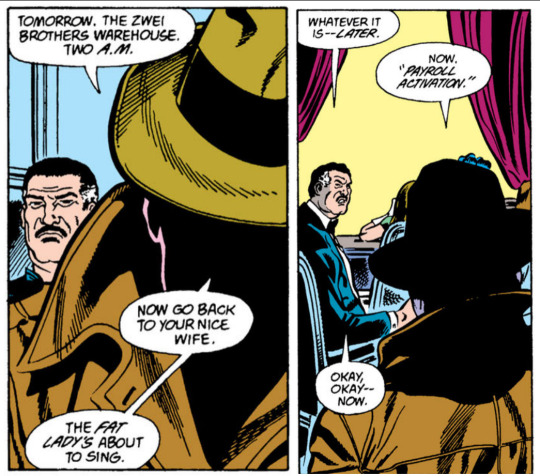

[image: first two panels are of two face, who is wearing a trench coat and a fedora that casts a shadodw and obscures his face so we cannot tell who he is. His face is completely in shadow. he is talking to someone behind him. he says "Tomorrow. The zwei brothers warehouse. Two am. Now go back to your wife. the fat lady's about to sing." in the next panel, we see him from behind. the back of his head is entirely in shadow to avoid giving us any hints as to who he is. the man he's talking to, Gerry sky, says "whatever it is -- later." two face says "now. 'payroll activation'" and gerry says "okay, okay -- now."
next there's a panel with the dialogue whited out. We still see two face, wearing gloves and having nearly all of his skin (except for his face, which is always in shadow) covered. First we look at him from above and he is small against a dark room with a bookshelf in the background. Then there's a closeup of only his gloved hand as he turns off the radio. We see him from behind (thighs up) as he stands in front of a window, then another shot of his gloved hand trying to touch the radio. and both his hands clench in fists. He hits the radio, breaking it (his body is still off screen except for his arm and hand) and then at his feet we see the broken radio. end image]
end image/begin commentary - Framing of two face on panel
Notice: The presumed “camera angle” is dynamic around Two face. We see him from multiple angles -- from both in front and behind. When we are looking at the same thing he's looking at, we are positioned behind him, like we're looking over his shoulder. the close ups on his hand are not positioned as if he's looking at his own hand and we are in his head pay special attention to the panel he's adjusting the radio on and the fourth panel of the page -- we're looking from the side of him or from behind him and under his elbow there.
Two face is our mysterious bad guy. This is how they visually frame a character they want an air of mystery around.
compare that to the framing around tim
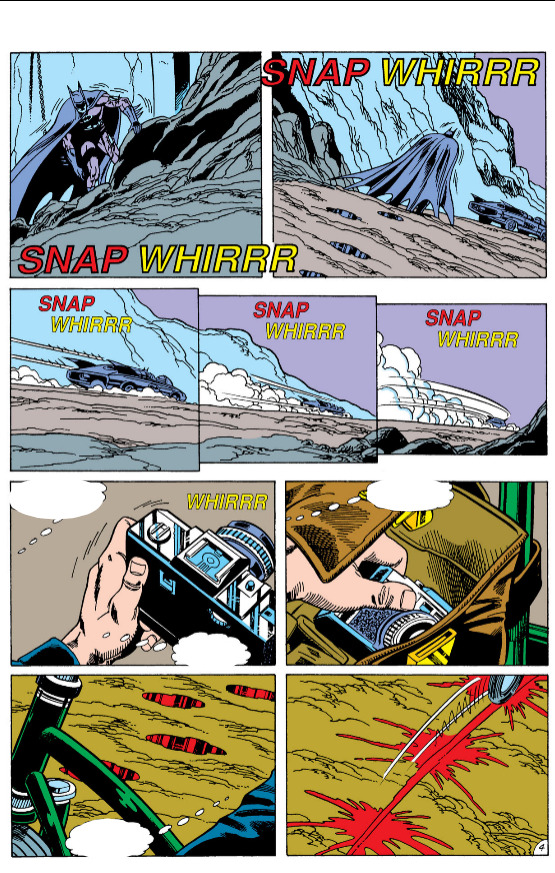
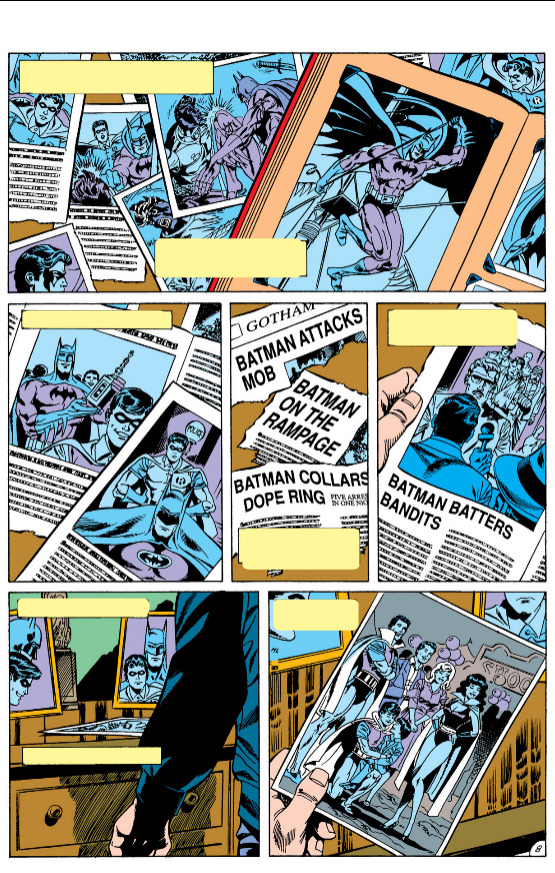
[image: first, we are looking through a camera that is continuously taking pictures of Batman as he stumbles down a slide, walks shakily to his batmobile, and takes off. then the camera is lowered (we see the hand that is lowering the camera in the view, it is below us as if we were looking through this person's eyes) and put inside a duffle bag. after that, we see something in the conrer of the screen -- an arm wearing a jacket?) and puddles of blood, then a bike tire -- but not the rest of the bike, which is off panel -- cutting through the puddles of blood. next pages shows a bunch of internal monologue that has been blockedo ut. a series of batman and robin pictures from the newspapers and a picture of batman swinging on a line in a scrap book. (in the first panel, batman and robin looking victorious in pictures, the second panel some headlines: “batman attacks mom” and “batman on the rampage” and “batman collars dope ring”. the third a picture of reporters interviewing gordon captioned with “batman batters bandits”. we can see the hand grabbing this picture as if we were holding it.
then we appear to be behind whoever is on the page, looking at his elbow, as he opens up a drawer, then we're back "inside" his head again as he holds up a photo with the graysons (john, dick, mary) and the drakes (tim and his parents). 3 year old tim is sitting on 12 year old dick's leg. end image]
end image/begin commentary - Framing of Tim in Panel
okay sorry forgive me but this is fucking fascinating in my opinion. Notice that for two face, most of the close ups on his hands were specifically away from his point of view -- we weren’t positioned where his eyes were, but looking from the outside in.
For tim, we’re almost always looking through his eyes, contrasting to two face
and for tim, even when we were not looking through his eyes, in the very first page, he wasn’t even on panel -- we knew nothing about him, we just saw the edge of his bike. the second page we saw a bit of his arm but we never zoom out far enough to see his whole body and definitely not his face -- even if it would be obscured by shadow.
The first read through, I assumed they were going for an air of mystery, but the contrast between how they handle two face and tim to me makes it clear that they weren’t -- it might have been an unintended side effect, or a bonus effect, but it wasn’t the main purpose. The audience is literally viewing most of the panels Tim is in through Tim’s eyes. He is almost literally an audience avatar.
My general hypothesis here (which I think I am supplying proof of) is that Tim is intended to be an avatar in universe for the “average comic reader" (with some assumptions made by the writer about the average comic reader re: race, age, gender, socioeconomic class)
For more support of this, let’s see how Tim talks about batman and robin --
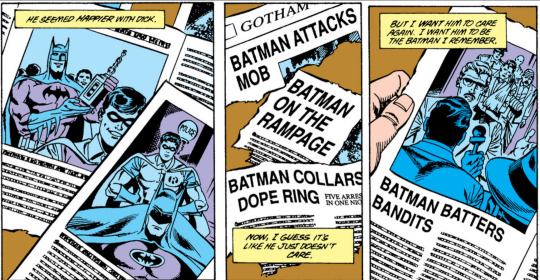


[image: 3 comic panels from batman 440 featuring newspaper clippings (in the first panel, batman and robin looking victorious in pictures, the second panel some headlines: “batman attacks mom” and “batman on the rampage” and “batman collars dope ring”. the third a picture of reporters interviewing gordon captioned with “batman batters bandits”. there is internal monologue from (the framing of the scene implies tim drake, but at this point he is unknown to the audience) reading “He seemed happier with dick. Now, I guess it’s like he just doesn’t care. But I want him to care again. I want him to be the batman I remember.” then, we have panels from the new titans 61 dick, as nightwing, is reaching in to talk to tim. he grabs tim's arm. dick says, “I don't believe this. that man raised me. I've gone through hell with him and because of him. Don't lecture me about him until you've cared for him and loved him as long as I have”. dick puts his helmet on and drives off on his bike. before leaving, he says "when jason died, he took robin with him." Tim cries and calls after him: "I... I was only thinking of the team... of what Batman and Robin meant! You can't let a legend die like that, Dick..." end image]
end image/begin comment - Tim’s perception of Batman & Robin
Notice in the first panels (with the newspaper clippings) that Tim is reminiscent, he specifically talks about ‘teh batman and robin’ that he remembers. The narrative puts more significance for tim on the fact that batman is not happy and he is not the batman tim remembers, rather than the fact that batman is beating people nearly to death (tim notices this, and it seems to be a “because batman is so clearly sad” thing -- which this is not I believe intended to be a commentary on tim’s priorities, since the general narrative seems to be using bruce’s ultra-violence as a sign he’s angsty).
Then, compare dick’s reaction to bruce with Tim’s.
Dick’s connection to Bruce is extremely personal. Bruce, Batman, whatever, is his dad and raised him and, like he said, put him through hell sometimes. His connection to Jason’s death is similarly personal.
Tim’s connection to Batman and Robin is extremely abstract and idealized. He is thinking of them as, say, a comics reader might think of them. As a crimefighting team who are not together anymore, and this is bad.
this is just bulletpoint 2 in “tim is supposed to represent the audience”, not intending to be a condemnation of tim.
Thirdly
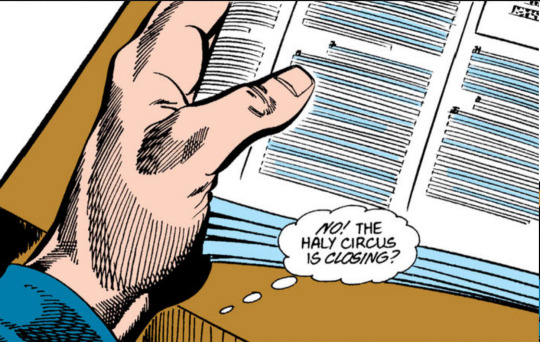

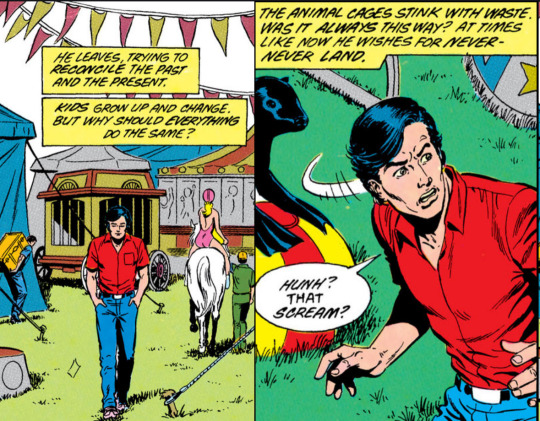
[image: first, a comic panel from Batman 440 showing a close up of Tim’s hand as he reads a paper and him thinking ‘No! the haly circus is closing?’ then, a series of comic panels from the new titans # 60. first, we see mr haly (off screen) and his cigar (on screen) as haly gestures at a photo of the flying grayson's on the wall. then he says "Yeah. Cost us a fortune and brought down our selling price. You know, sometimes I sit here and just remember the good old days. We were barely breaking even back then, too -- but man, were we having fun. then, we see dick grayson wearing jeans and a red shirt, walking through the circus ground. first, he looks kind of dejected and his hands are in his pockets. the narration box reads "he leaves, trying to reconcile the past and the present. Kids grow up and change. but why should everything do the same? The animal cages stink with waste. Was it always this way? At times like now, he wishes for never-never land." then, dick turns as he hears something and says "Hunh? That scream?" end image]
end image/begin comment - Nostalgia as a Theme
Nostalgia is an EXTREMELY strong theme in this comic. Batman is different, he’s not like he used to be. Haley’s circus is different and at risk, but Dick goes back and meets the performers he used to know -- some are still the same, some are in a more rough situation (alcoholic clown). Someone’s trying to kill his friends in the circus, it’s not really a place of childhood innocence for Dick. Dick explicitly wishes to be in never-never land (the imaginary far off place where you never grow up)
How things should be -- both in Tim’s mind and Dick’s mind, Haly’s mind -- is the idealistic past, but we clearly can’t go back to it -- Dick says that the first thing Bruce taught him was how to grow up.
Next bulletpoint:
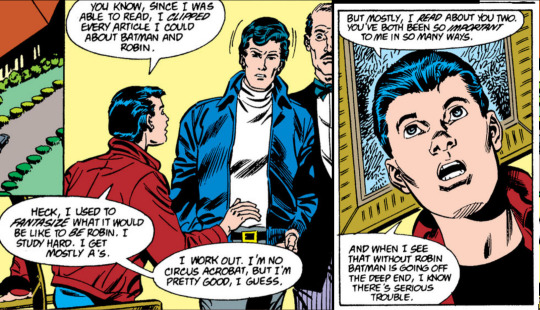

[image: first are some comic panels showing Tim Drake talking to Dick Grayson and Alfred Pennyworth in wayne manor. Tim says “You know, since I was able to read, I clipped every article I could about Batman and Robin. Heck, I used to fantasize about what it would be like to be robin. I study hard. I get mostly A’s. I work out. I’m no circus acrobat, but I’m pretty good, I guess. But mostly, I read aobut you two. You’ve both been so important to me in so many ways. And when I see that without Robin Batman is going off hte deep end, I know there’s serious trouble.” next, we see Dick stepping forward and talking to Tim. he says "But you haven't told me anything I don't already know. I want the rest of it. All of it." end image]
end image/ begin commentary - textually a fanboy
Textually, Tim is presented as a Batman and Robin fanboy -- that’s how he found Batman’s secret identity (link)
He studies Batman and Robin from afar. He reads about them. Kind of like a comics reader would. he wants to be Robin. Again, superhero comics have some wish fulfillment element and definitely wanting to imagine yourself in a character’s shoes is an appeal for many fans. Tim wanted to imagine himself in robin’s shoes and fantasized about being him -- there’s kind of two layers here, one is the presumed audience member reading tim, wanting to imagine themselves in his shoes as he interacts with his heroes, the other is tim, who wanted to imagine himself in dick’s shoes.
re: the second posted image in this set: Tim hasn’t told dick anything that dick doesn’t know, because tim doesn’t know anything dick doesn’t know -- he is the comic reader here. That’s also why he’s so up-to-date on all of the other comic character’s stuff -- we see him list off all of the teen titans, he talks about jason’s death casually, he knows that alfred is batman’s confident -- he pretty much has all of the information that a reader of DC comics would have if they just got beamed into the DC universe at this point.
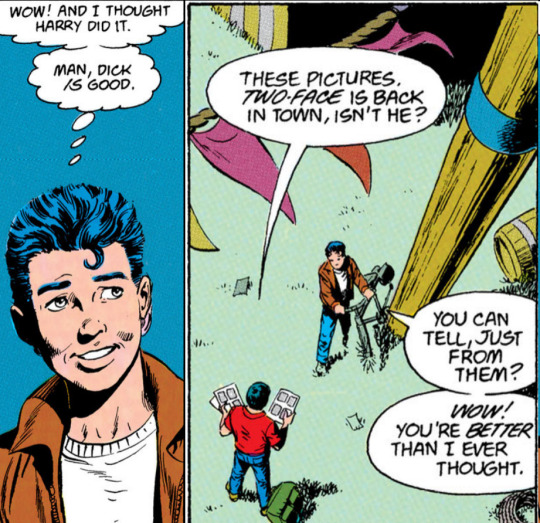
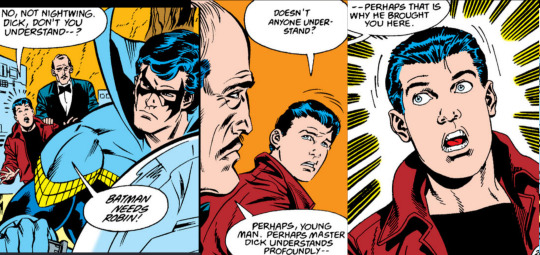
[image: first, two panels, one showing tim smiling and thinking "Wow! And I thought Harry did it. Man, Dick is good". tehn we see dick holding some photos and talking ot tim, who is at his bike. dick says "These pictures, two face is back in town, isn't he?" Tim says "You can tell, just from them? Wow! You're even better than I thought." the next scene is in the batcave. Dick is nightwing and is about to leave on his motor cycle, alfred and tim are behind him. tim says "no, not nightwing, Dick. don't you understand -- Batman needs Robin!" he turns to look at alfred and says "Doesn't anyone understand?" Alfred says "Perhaps, young man. Perhaps master Dick understands profoundly -- perhaps that is why he brought you here." tim looks surprised. end image]
end image/begin commentary: The old robin’s approval
another very important thing here: DC plays it as safe as possible with tim’s introduction, trying to make the audience like him, and one is definitely establishing that Tim both looks up to dick and thinks he’s cool (first two panels) and that he has dick’s presumed approval/blessing to be robin (last three panels). it’s also important to note that while tim is portrayed as competent, he never shows up Batman and Nightwing -- he rescues them because two-face lured them into an expert trap, but he doesn’t outdo either of them on fighting or detective work. this has an in universe explanation -- he is 13 years old, just starting out -- and an out of universe explanation -- if he’s not showing up anyone’s favorite character, he is presumably more palatable and less threatening for the presumed reader.
that’s what i mean when I say taht DC played their intro of tim very safe -- he falls in with the established characters, already likes them, is practically already a fan of them with full fanboy connotations. The idealized past is presented as something as desirable, both to the reader and to the characters themselves, and there is a strong current of nostalgia and returning things to how they “should” be with Batman having a robin. Tim voices what many readers may feel: That batman lost his way, that he needs Robin, and he gets to act out those feelings in the comic. the text acknowledges that they can’t just force dick back into it, that people have to grow up, and dick passes the mantle to tim.
overall I think that tim’s employment here was effective, but I look forward to seeing more when he’s allowed to be himself rather than an audience avatar. I understand lots of people like audience avatars and he was wildly popular presumably for those reasons, but I personally found the plotline lackluster at points.
#okay here it is#fade reads dc comics#dc comics#a lonely place of dying#batman 1940#dick grayson#tim drake#batfam#alfred pennyworth#bruce wayne#character meta#or more of like#comic meta
58 notes
·
View notes
Text
ok I just saw another post floating around about how people absolutely have to be reading novels rather than fanfiction and I just want to gently lay my thoughts here so that I may rest.
First of all, I totally get that impulse! there’s so much merit in consuming complex long-form lit if you can; it’s always crucial to stay informed, and it’s very cool to be supportive of authors (especially those who are marginalized, and whose narratives have been erased).
But I’ve also seen a lot of this intense, morally superior attitude, which makes a lot of assumptions about what qualifies as fanfiction and what actually constitutes capital L Literature. There’s always this mentality of like ‘oh wow do you want to read rpf mpreg porn or do you want to read Joyce like a big boy’, which seems...... reductive
Fanfiction is a many splendored thing! People write all manner of fluff and porn, but they can also spend a great deal of time formulating plot, accumulating research, engineering original characters, elaborating upon world-building, racking up word counts, acquiring their own fanbases, etc, etc
Like I’m sure I don’t have to tell you why it’s problematic to put classic literature on a pedestal and relegate all fan-made works to obscurity, but even if it WASN’T problematic, it also loses much of the spirit of literary criticism!!
We could be having a much more nuanced conversation about commissioned Virgil, bawdy propagandist Shakespeare and trashy serialized Dickens, about parody, satire, print culture, and intertextuality. I was just reading Celia B Whitehead’s follow-up to Henry James’ The Bostonians called “Another Chapter of the Bostonians” under the pseudonym ‘Henrietta James’, and that’s fix-it fic baby! It’s critical and funny and self aware!
How long exactly does something have to be in the public domain for it to stop being a fan work and start being allusion? what are the criteria that separate fic from literature? It can’t be word count, or hours logged, or drafting/editing processes, because those are so similar in the fic writing community that they would be impossible to sift out. Is it just about originality? publishability?
Can YOU pinpoint the moment that fanfiction becomes literature? Is it when you “command F--replace all” those pesky copyrighted names? is THAT the only border between trash and art? Shouldn’t we talk about that a bit more?
People write fanfiction that is more original content than reference material, and classical authors heavily appropriate their favourite characters, tropes, and settings, and those two behaviours bear strikingly similar fruit.
It’s easy to cry inexperience and completely discard fanfiction, and it’s easy to uphold a seminal text and thereby dodge the gruelling work of demystifying its production or retroactively putting slippery, playful, metatextual writing into categories. But man I really think you do literature a disservice when you paint with so broad a brush.
And in the meantime, what’s the merit of casting aspersions on an accessible form of writing for readers and authors alike? It’s free, it’s creative, it’s bombastic (I could also talk about how it belongs largely to young women and queer ppl, and how the disdain kind of.. stinks), it’s an unfathomable array of things, like all art.
If you want to talk about diverse creators, revitalizing the canon, and reading to expand your horizons, fab! Of course I think people should read books if they can, but not everyone has a consistent attention span, ability, energy, or desire. (Also if you think people who read and write fanfiction literally don’t read or write anything else I..... don’t know what to say to you.) Reading online articles and fan works because it’s easier to curate your reading experience is.... fine actually.
Reducing fanfiction to amateurish nonsense is often mean-spirited, but like mainly it displays a pretty glaring gap in your understanding of the genre. I promise it’s more useful to elevate your criticism beyond ‘fan work bad.. lazy... horny’ and ‘books good! acceptable to enjoy! I am very intelligent!’
Also I don’t really see people demanding that people stop consuming fanart and start consuming “real art”, maybe because it’s more obvious that much of the same technical skill goes into both, which is good to keep in mind when you’re filled with righteous anger and moral superiority because a community is sharing art.
And frankly, it’s a super interesting subculture, if you truly cared about literary or cultural studies. There’s a lot to get into: the increased impact and visibility of fan works with the advent of internet culture, the mutual influence of creator and audience, the way that stylistic mimicry/translation is a unique skill unto itself, the linguistic rules that have been created to label and circulate specific content i.e.: rarepair, AU, angst vs fluff, PWP, slow burn, etc.
Like I’m in grad school for the express purpose of reading books & I obviously think they’re Good, so that’s exactly why I think it’s dangerous to start closing off certain avenues of literary engagement because we’ve arbitrarily decided that they’re worthless :/
#fanfiction is cool you guys are just mean#fanfiction#writing#long post#sorry i have my essay hat on a little bit
363 notes
·
View notes
Text
The Triumph of the Marginalia
Marginalia, n.:
1 : notes or embellishments in the margins (as in a book)
2 : nonessential items
-Troll OED
Is it just me, or is Nepeta and Equius’s arc the most slept-upon piece of brilliance in all of Homestuck?
A brilliance, might I add, that culminates in possibly the most triumphant, fulfilling emotional moment in the entire work:
https://www.homestuck.com/story/7928
*stands back and beholds its majesty while from the background comes the sound of James Roach brutally murdering ska*
No, but actually, I mean this 100% unironically, and by the end of this post, I think you’ll agree with me.
By now, I think we all understand the Act 6 double metaphor: the series of temporal loops and universes that Lord English commands is paralleled with, and in fact totally identical to, the narrative of Homestuck. Our characters’ lives exist within this context. They struggle to escape it, and are defined both by it and by the rejection of it.
Enter Nepeta.
The metaphorical meaning of Nepeta in Homestuck is irrelevance, and that’s why she’s the most relevant character in any discussion.
Nepeta was one of the characters killed off during the Murderstuck arc. Hussie argued that she was perfect for this role. In fact, I believe he said something like “Nepeta is sweet, but if you look up the dictionary definition of ‘expendable character,’ you’ll see a picture of Nepeta playing with a ball of yarn and looking very cute.” She’s an endearing combination of shipper girl and apex predator, but not one of your Vriskas or Terezis in being a driver of the plot. Hussie, it seems, created her just to round out the troll cast. He described one of his purposes in Murderstuck as being to axe some of the less necessary trolls to reduce the scope of his character list.
Except that didn’t really happen, did it?
Like a cat with nine lives, Nepeta just keeps coming back.
Equius is another addition to the troll cast who gets pushed away from the main action. He was a character-writing challenge: how do you make someone who’s gross, uncomfortable, and racist kind of likable anyway? I’d argue Hussie succeeded, in large part because of Equius’s relationship with Nepeta. By the time you finish with Hivebent, you’ll probably have a little fondness for their moraillegiance. And if that doesn’t do it, the conversation that serves as their swansong in Equius: Seek the Highblood will tear your heartstrings to shreds.
Because Equius dies, tragically clownmurdered. There was, at the time, some stink over this from Equius fans. Would he have really let himself be killed so easily? Hussie countered: yes, and it was the most in-character thing he could have done. He died doing what he loved: being asphyxiated erotically and horrifically by a superior. Truly, there could be no more fitting end to his character than that.
And yet.
No sooner did Hussie complete his self-appointed story cleanup challenge than he immediately began to undo his own work. It’s almost as if, in declaring his intention to own those who preferred more characters to narrative economy, he immediately had to own himself??
By the time we get even a little way into Act 6, we’re deep in the dreambubble landscape, meeting dead characters left and right. And who should show up there but Equius and Nepeta? Equius attempting to get it on with a bunch of Aradias, who dump him. And Nepeta, living out her romantic dreams as a representative of a timeline where she got together with Karkat. They both appear as symbols of this deadness, this irrelevance. Except that that brings them back into the story, into the spotlight – the opposite of where they’re supposed to be!
Like many bits of commentary, Hussie continues to incorporate the metaphor Nepeta=Irrelevance into Homestuck. Karkat’s remark on their journey that he would love to meet “FIFTY FUCKING NEPETAS” and embark on “NEPETAQUEST” alludes to formspring remarks to the effect that, no, Homestuck was not going to have much time for the minor characters. Except it clearly did.
Why couldn’t the narrative let the meowrails go? Was it that despite the economy of Murderstuck, something was still incomplete? After all, one of Equius’s charms was that he appeared to be growing into a less repressed, kinder person. In Seek the Highblood, we see him letting his guard down enough to roleplay with Nepeta for a change. Their love for each other: wasn’t that ultimately what could redeem Equius in our eyes? So his dying and thus failing to protect her–isn’t that something that should be addressed?
You could imagine many a Nepeta and Equius fan saying this to Hussie back in 2011.
But Hussie was already saying it to himself.
The duo come roaring back into the story in the Trickster mode arc, mid Act 6, thanks to Gamzee’s ridiculous resurrections. True, Nepeta is still reduced as part of Fefeta, the character formed from killed-off girls who never speaks onscreen. But doesn’t using that fact as a running gag kind of draw our attention to it? Doesn’t the fact that Fefeta talks to Roxy constantly offscreen inform us that once we get outside the frame of the narrative, Nepeta has a rich inner life and countless stories to tell?
And it’s here that Equius gets something he never got in his original “arc:” the chance to apologize to Nepeta. You’d be forgiven for missing it since there’s so much else going on at the time, but he does, while fused with AR. Here’s what you’d miss, though: he’s grown as a person in the afterlife. He’s come to regret that moment of weakness, where his fetish kept him from protecting his moirail. Impossible as it seems, he’s continuing his character arc.
The scene ends with Fefeta exploding (she’s also, after all, dealing with Eridan), but it leaves us with a tantalizing question:
Will Nepeta forgive Equius? Is there even a plausible time and space in that story when she could respond to his words?
Do you see what’s happening here? Instead of being erased, Nepeta and Equius are starting to slip the bounds of the story that killed them. They leap in and out of the frame, half-mythical figures. Marginalized, they write their own stories in the margins. They exist in complete defiance of the original logic of Homestuck.
Lord English is an alt-Author figure, a dark, brutal reflection of narrative control and narrative necessity. His world, in which horrible choices are necessary, in which the alpha timeline is a ticking clock leading inexorably to his manifestation, is one that beats down people not deemed important enough by his narrative. Which makes it identical to the one we’re reading. Throw all the unnecessary characters in the trash. Kill them off, if it suits my purposes. The world doesn’t need Nepeta.
Which is precisely why it does. Because isn’t defying Lord English the entire point? Isn’t it what Homestuck reveals as truly heroic?
What might Nepeta be capable of?
Let’s talk about two other victims of English’s forces of marginalization. Davesprite might be the most quintessential example. He teaches us what the alpha timeline is and how it works, by going back to fix a doomed timeline and submitting to being doomed himself. Except he merges with a bird and avoids that fate. Okay, but he clearly gets killed off fighting Jack in Jade: Enter. Except he comes back and hangs out with Jadesprite. Okay, but he dies in the planetsplode in the Retcon. Nope, he comes back from that, too. Huh. He keeps slipping the fate decreed for him by – who else? Lord English.
But it’s a struggle, clearly. He’s caught up in various cycles of guilt and shame. Over being “not the real Dave.” Over his feeling that he has to be a hero in the sense Bro demanded he be. Hussie describes Davesprite as fitting the “way of the unbroken sword:” his experiences have led him to believe in being strong and capable at the expense of all else, in contrast with the other Dave, whose belief in Bros’ toxic ideas is beginning to slip – the “way of the broken sword.” And where did Bro get his toxic ideas from? At least in part, the whispering voice of the soul of Lord English.
Now we turn to Dirk. Like Dave, Dirk has a marginalized, “less important” splinter self but it’s more of a pressing concern. AR shows Dirk’s darker side: exhibiting manipulative tendencies that human Dirk is trying to move away from. He’s also a copy removed from humanity, who feels an understandable amount of disillusionment about being removed from physical existence and his own identity. But as much as Dirk may splinter, like his dumb anime sword, he never breaks. What this means in the symbolic language of Homestuck is that Dirk lives fully, instinctually, in the way of the sword. He believe in a world of hard choices, masculine heroism, and necessity. Ultimately, this, too, is part of what makes Bro so harmful to Dave. In AR and Davesprite, we have a strange parallel: two splinter selves, both of whom are enmeshed in the logic of LE.
Except AR, unlike Davesprite…kind of is LE.
What is Lord English composed of? Well, there’s Caliborn, the most unrepentant shithead of all time. There’s Gamzee, embodiment of horrifying clownery. And then there’s AR, a version of Dirk even more removed from the person he wants to be.
And…Equius?
Allow me a moment to get really indulgent and take a big puff on my Homestuck scholar’s pipe.
The metaphorical meaning of Equius in Homestuck is: sort of growing out of being a creepy racist.
Or maybe let’s say: the opportunity to do that. We said that Equius was on the verge of being redeemed (even had been, in the eyes of many readers). What does it mean to stick him in with Lord English’s souls? It means two things:
1) Equius is a product of his society, which was shaped by Doc Scratch, aka by Lord English, both of whom are kind of him, but Scratch picks up on his traits especially. This is a recognition of that fact: the part of him that sucks is, itself, Lord English in a dizzying loop.
2) Equius’s story is a tragedy. It is the story of a kid who started to escape his society’s tendencies, but was sucked back in by the evil force behind them.
Although…maybe that’s not the whole story.
Because both Equius and AR aren’t really that bad. AR’s pretty understandable, and by no means beyond the possibility of goodness. And the combination of the two? Honestly, pretty harmless. They counter each other’s worst tendencies by devolving into a weird goofball. In fact, AR even says he wants to do something heroic: to sacrifice himself for something really important. He does, kind of, mustering a last-ditch robohorse assault on Caliborn. But at the same time, this is the substance of his tragedy. A hero whose defeat of a great evil forces him to become the substance of that evil. Which could not be a more fitting summary of how these characters function in their story.
But maybe that’s still not the whole story.
Enter Davepeta.
At first glance, the creation of Davepeta seems like Hussie’s most batshit troll move yet. I feel pretty confident in saying that even those who predicted either of these characters returning didn’t see that one coming. However, a few pages of Davepeta’s presence reveals a fundamental truth:
Davepeta is fucking amazing.
In them, Davesprite’s depressive moods are buoyed up by Nepeta’s upbeat optimism. Nepeta’s reclusive shyness is balanced by Dave’s tendency toward brash banter. Both of them gain confidence from being the new person they are. They quickly let go of ideas inherited from the world that kept them from self-knowledge and happiness. Dave, his toxic masculinity; Nepeta, her fear.
A great point I’ve seen made is how much Jasprose and Davepeta resemble fantasy selves for Rose and Dave: indulgent, technicolor manifestations of people they could be if they let go of inhibitions and limitations. But I think Davepeta is the most unambiguously positive of the two.
The metaphorical meaning of Davepeta in Homestuck?
Growth.
Not giving a fuck about what the world thinks. The world, aka Lord English. Because Lord English could never have predicted that his machinations would also spawn a confident, powerful fusion of two beings he had discarded as totally irrelevant.
They’re also a multicolored non-binary furry, so that’s even more points in the pissing off shitheads column.
They are someone Lord English never conceived of, never could have conceived of, but which lay as potential within his domain all along.
And if Lord English is a reflection of the author, of what Hussie feels one has to destroy or sacrifice, than Davepeta is an indulgence existing in defiance of all that.
And this makes Davepeta the most powerful person of all.
They are the light at the end of the tunnel. They are the person you could be, if you could get past your mental shackles and just grow. It may not be possible to ever get there as a mortal human, may only be for a godlike sprite, but striving to be like them matters, is purpose and fulfilment enough.
And they love ARquius.
Nepeta believed in Equius, believed he could grow, and was growing. So as much as ARquius traps himself in a Lord English loop of his own making – grown, perhaps, out of Dirk’s belief that there should be a loop, that importance is admirable—Davepeta pulls from him, in his last scene, his finest qualities. His love.
Equius asks forgiveness again, and this time, Nepeta’s able to give it. Davepeta easily accepts ARquius’s apology, an apology which never could have existed within the confines of a normal narrative. A reconciliation that both of them fought for by defying their narrative, by existing outside it. By being not the trolls who lived and died, but their broader, conceptual selves, who exist beyond lifetimes. Beyond the comic page. And they consummate that reconciliation with that most cherished and loving of gestures:
A hug.
And even as this is Equius and Nepeta’s reconciliation, it’s also Dirk and Dave’s. Which, I should mention, is also taking place, simultaneously and circumstantially simultaneously, just below. It’s a more difficult one, certainly, especially as filtered through the splinters of Davesprite and AR. Here forgiveness is not quite the right word. But – knowledge, and recognition, and a kind of peace. It’s Davesprite’s chance to reunite with the part of his brother he loved, while also being a person who’s grown beyond him. And it’s AR’s chance to be loved.
Oh, sure, the art is ridiculous, the pose absurd. But that’s what makes it sublime.
I mean, what did you think that Sbahj comic was really about?
A boy distancing himself from his feelings through irony, never acknowledging that the story he’s telling is about two bros who desperately want to hug each other, but don’t know how.
Here’s the hug.
I want to dip into Epilogues territory for a moment, but it’s territory which is fairly well implied by Davepeta’s statements and role in Collide. The Meat Epilogue, I think, only illuminates what was already there.
Lord English is uniquely vulnerable to Davepeta.
And why shouldn’t he be? They, like so much else in Homestuck, are a consequence of his actions spiraling far beyond his control. But it’s more than that. Davepeta is finally able to lay the unbroken sword to rest by following the “prophecy” about Dave defeating Lord English. On the one hand, that’s kind of what happened. But it’s also completely different from what English intended, antithetical to his desires and goals. Which makes the victory all the sweeter. But at the end of the day, Davepeta doesn’t fight for the reasons Davesprite did. They’re free of that, now. Instead, they fight from a place of genuine compassion. Because Davesprite, like Dave, knows the true meaning of being a hero: caring about one’s friends.
But the most important thing about Davepeta is that they know Lord English, on a level that perhaps neither he nor they recognize. Both AR and Equius are in there, and both are capable of redemption. It’s only Gamzee and Caliborn who are truly beyond it.
How does Davepeta defeat Lord English?
With a hug.
They wrap their claws around him, and carry him into the sun like a piece of garbage. It’s an aggressive hold, but it’s also effectively an embrace.
And I have to wonder: in those final moments, did they sense a connection there? Did Equius and Dirk stir somewhere within Lord English? Did they give him a moment’s pause? Resist him? Make it just the tiniest bit easier for Davepeta to do their work?
If so, then that, too, is heroism.
At the very least, it’s circumstantially simultaneous with the hug we see in Act 6, and so it carries the same message:
Redemption.
Not for the shitheads, but for those who wanted to be better.
And if this isn’t enough, there’s a third reconciliation here, too: between author and reader, or to put it in other terms, author and character.
If Lord English is a shadow of the author, what part of the author can be redeemed? Maybe not the destructive, antagonistic urges. But the part that plans and designs and philosophizes as Dirk does. That part of Hussie wanted Davepeta to be there, to strike that final blow, and made it happen.
Because, when you get right down to it, as much as Hussie pretends to be antagonistic toward his readers and the characters they enjoy, it’s the fans, the shippers, the furries, those whose hearts go out to a cute, shy cat girl that he most celebrates.
Hussie fucking loves Nepeta.
Nepeta and Equius are, sneakily, the best characters in Homestuck, because they understand its fundamental message: that to succeed in Homestuck is to defy Homestuck. They defy everything it throws at them, and somehow, improbably, come out on top.
All of this is there on that page, a whole edifice of storytelling culminating in that singular, grand, supremely indulgent expression, a feast of looping leitmotif and color and imagery and meme and sound. It’s all there, if you know where to look.
Nepeta and Equius love each other, and that’s pretty fucking great.
See? I told you.
<> Ari
#nepeta#equius#davepeta#homestuck analysis#arquius#meowrails#davesprite#hal#trying to get out ahead of hussie's commentary for a change#happy 4/13 :33#<3#stay tuned#feast of homestuck 2020
345 notes
·
View notes
Text
A Jewish Evil Regal perspective on redemptive suffering
Reposted from my personal Tumblr.
“The Jewish perspective is that this world is the focus and therefore suffering stinks and should be minimized. Christianity holds that the next world is more important than this world and that suffering ennobles.” –Luke Ford, “Jewish vs. Christian Views on Suffering”
“[T]he idea that suffering horribly should make people more morally attuned, and behave more ethically […] is more a fatuous truism than an authentic truth. The notion that suffering makes anyone better may have deep intuitive and socio-cultural roots, especially in Christian tradition, but it is far from a demonstrable axiom.
"The historical record suggests that survivors of the Holocaust did not necessarily emerge as more sensitive to human suffering than people who had not gone through the Holocaust. Nor should they have. Since there is no such thing as an archetypical Holocaust survivor, there is no such thing as a typical response. Each person entered the Holocaust with his or her distinctive characteristics, endured a unique set of Holocaust-related circumstances and emerged from the Holocaust with his or her own personal perceptions, lessons and conclusions. Undoubtedly, some survivors emerged with a heightened awareness toward human suffering and a resultant moral sensibility, but obviously others did not. The only common denominator regarding the suffering of the Holocaust is that it inevitably included extreme pain and left an indelible scar.” –Robert Rozett, “Suffering Doesn’t Beget Moral Capital”
These are a direct contradiction to one of the one of the more pervasive underlying assumptions behind people’s interpretations of Regina’s behavior. Namely, that the suffering she endured should have ennobled her in some way. That she could, and should, without any help whatsoever, be able to shrug off the effects of years of abuse, trauma, and manipulation to make healthy, positive decisions.
By contrast, this perspective suggests otherwise. It seems to ask that when a young woman is subjected to great torment, what the hell do you expect to happen?
“Central to the Jewish response to suffering is a staunch rejection of the belief in its redemptive power. […] It leads to a tortured spirit and a pessimistic outlook on life. It scars our psyches and brings about a cynical consciousness, devoid of hope. Suffering causes us to dig out uncertainty in the hearts of our fellows and to be envious of other people’s happiness. If individuals do become better as a result of their suffering, it is despite the fact that they suffered, not because of it. Ennobling of character comes from triumph over suffering, rather than its endurance.” –Schmuley Boteach, Judaism for Everyone: Renewing Your Life Through the Vibrant Lessons of the Jewish Faith“
This is an interesting rebuttal of the idea that people earn happiness because they are good. In fact, it seems to imply the inverse: that a certain measure of happiness is necessary for us to do good.
Despite what we say about free will and our choices, what the above quote suggests is that in the Jewish worldview, suffering undermines our ability to make real choices because we’re constantly struggling against the effects of our trauma or unconsciously acting it out.
This is not fatalism. It’s acknowledging that where we come from and what we’ve gone through have powerful impacts on the choices we can make. Some of us–perhaps most–have learned some limiting or destructive things about ourselves and about life, and if approached by the right person in the right way at the right time, we can learn new ways. But we can’t always know or do that without help.
"In Judaism, suffering doesn’t define us. Our ability to respond to the suffering of others does. We don’t see suffering as expiation or cleansing of sin, as do some other faiths.” –Laurie Zoloth, interview
“So many people search for a reason why people suffer. They want to redeem tragedy by giving it meaning. Suffering ennobles the spirit, they say. It makes you more mature. It helps you focus on what’s important in life.
"I would argue that suffering has no purpose, no redeeming qualities, and any attempts to infuse it with rich significance are deeply misguided.
"Of course suffering can lead ultimately to a positive outcome. […] But does it have to come about this way? Is suffering the only way to learn goodness?
"Jewish values maintain that there is no good that comes from suffering that could not have come through a more blessed means. […]
"Here is another way that Jewish values are so strongly distinguished from other value systems. Many religions believes that suffering is redemptive. […]
"But Judaism, in prophesying a perfect Messianic future where there is no death or pain ultimately rejects the suffering-is-redemptive narrative. Suffering isn’t a blessing, it’s a curse. Jews are obligated to alleviate all human misery. Suffering leaves you bitter rather than blessed, scarred rather than humble. Few endure suffering without serious and lasting trauma. […]” –Schmuley Boteach, “No Holds Barred: The Truth About Suffering”
If suffering creates Evil Queens, these quotes imply that even more suffering is not going to redeem an Evil Queen. At this point, wishing more suffering on someone who has already suffered so much is not instructive but sadistic. Even if she brought a lot of it on herself, indifference toward her suffering or hoping that she suffers even more simply does not work. It only creates an endless loop of pain and misery.
And if Jews wanted eternal damnation for their sins, they would have become Christians.
20 notes
·
View notes
Text
The problem with redemptive suffering: A Jewish Evil Regal perspective
Note: This is a repost from my personal blog.
“The Jewish perspective is that this world is the focus and therefore suffering stinks and should be minimized. Christianity holds that the next world is more important than this world and that suffering ennobles.” –Luke Ford, “Jewish vs. Christian Views on Suffering”
“[T]he idea that suffering horribly should make people more morally attuned, and behave more ethically […] is more a fatuous truism than an authentic truth. The notion that suffering makes anyone better may have deep intuitive and socio-cultural roots, especially in Christian tradition, but it is far from a demonstrable axiom.
"The historical record suggests that survivors of the Holocaust did not necessarily emerge as more sensitive to human suffering than people who had not gone through the Holocaust. Nor should they have. Since there is no such thing as an archetypical Holocaust survivor, there is no such thing as a typical response. Each person entered the Holocaust with his or her distinctive characteristics, endured a unique set of Holocaust-related circumstances and emerged from the Holocaust with his or her own personal perceptions, lessons and conclusions. Undoubtedly, some survivors emerged with a heightened awareness toward human suffering and a resultant moral sensibility, but obviously others did not. The only common denominator regarding the suffering of the Holocaust is that it inevitably included extreme pain and left an indelible scar.” –Robert Rozett, “Suffering Doesn’t Beget Moral Capital”
These are a direct contradiction to one of the one of the more pervasive underlying assumptions behind people’s interpretations of Regina’s behavior. Namely, that the suffering she endured should have ennobled her in some way. That she could, and should, without any help whatsoever, be able to shrug off the effects of years of abuse, trauma, and manipulation to make healthy, positive decisions.
By contrast, this perspective suggests otherwise. It seems to ask that when a young woman is subjected to great torment, what the hell do you expect to happen?
“Central to the Jewish response to suffering is a staunch rejection of the belief in its redemptive power. […] It leads to a tortured spirit and a pessimistic outlook on life. It scars our psyches and brings about a cynical consciousness, devoid of hope. Suffering causes us to dig out uncertainty in the hearts of our fellows and to be envious of other people’s happiness. If individuals do become better as a result of their suffering, it is despite the fact that they suffered, not because of it. Ennobling of character comes from triumph over suffering, rather than its endurance.” –Schmuley Boteach, Judaism for Everyone: Renewing Your Life Through the Vibrant Lessons of the Jewish Faith“
This is an interesting rebuttal of the idea that people earn happiness because they are good. In fact, it seems to imply the inverse: that a certain measure of happiness is necessary for us to do good.
Despite what we say about free will and our choices, what the above quote suggests is that in the Jewish worldview, suffering undermines our ability to make real choices because we’re constantly struggling against the effects of our trauma or unconsciously acting it out.
This is not fatalism. It’s acknowledging that where we come from and what we’ve gone through have powerful impacts on the choices we can make. Some of us–perhaps most–have learned some limiting or destructive things about ourselves and about life, and if approached by the right person in the right way at the right time, we can learn new ways. But we can’t always know or do that without help.
"In Judaism, suffering doesn’t define us. Our ability to respond to the suffering of others does. We don’t see suffering as expiation or cleansing of sin, as do some other faiths.” –Laurie Zoloth, interview
“So many people search for a reason why people suffer. They want to redeem tragedy by giving it meaning. Suffering ennobles the spirit, they say. It makes you more mature. It helps you focus on what’s important in life.
"I would argue that suffering has no purpose, no redeeming qualities, and any attempts to infuse it with rich significance are deeply misguided.
"Of course suffering can lead ultimately to a positive outcome. […] But does it have to come about this way? Is suffering the only way to learn goodness?
"Jewish values maintain that there is no good that comes from suffering that could not have come through a more blessed means. […]
"Here is another way that Jewish values are so strongly distinguished from other value systems. Many religions believes that suffering is redemptive. […]
"But Judaism, in prophesying a perfect Messianic future where there is no death or pain ultimately rejects the suffering-is-redemptive narrative. Suffering isn’t a blessing, it’s a curse. Jews are obligated to alleviate all human misery. Suffering leaves you bitter rather than blessed, scarred rather than humble. Few endure suffering without serious and lasting trauma. […]” –Schmuley Boteach, “No Holds Barred: The Truth About Suffering”
If suffering creates Evil Queens, these quotes imply that even more suffering is not going to redeem an Evil Queen. At this point, wishing more suffering on someone who has already suffered so much is not instructive but sadistic. Even if she brought a lot of it on herself, indifference toward her suffering or hoping that she suffers even more simply does not work. It only creates an endless loop of pain and misery.
And if Jews wanted eternal damnation for their sins, they would have become Christians.
9 notes
·
View notes
Text
I’ve spent months ignoring the existence of batman: white knight for my own sanity and for that of my followers and yet the universe has conspired against me.
And so, I’ve been forced to acknowledge that it does in fact exist and sold relatively well and now I keep remembering even MORE details about it that made it a bad bad bad comic in spite of its decent aesthetic.
So this is me working out some personal frustration.
Through an analysis that involves very little actual plot arc by plot arc or panel by panel analysis because by Hera who, WHO? Has the energy or the emotional wherewithal to put that much effort into a post about this comic.
I mean maybe if it was the only way to fully exorcise the bad content but I’ve managed to not let it hook too deeply to my poor soul yet so just this should be fine. Right? right.
So because of that this is mostly just some of my personal feelings on it.
It is a rant that no one should read and was made with the only purpose being personal catharsis of negative emotions.
I send this forth, into the abyss.
In the hopes that I won’t have to think about this comic ever again once it is done.
It’s like a never ending onion, the more I think about it the more LAYERS of mistakes and horrible characterisation are revealed. Layers and layers of just slightly off and annoying things that really feed into deeper misconceptions about what the heroes and villains in Gotham really stand for and how they interact with each other so it turns out that actually even the little annoying things are just contributing to the BIG narrative problems that this comic has. I LITERALLY KEEP COMING UP WITH REASONS WHY IT’S THE WORST. I CAN’T STOP. HELP ME.
What’s worse is I can tell that the writer was definitely trying to do something cool and psuedo deep and say something (no clue what it was) about heroes and villains and the joker as a character, like really explore it, he just did in the worst possible way.
Holding up a mirror to Gotham and reversing things so that the Joker’s Heroic and Batman’s Criminal in their approaches isn’t a particularly new or original idea but the writer really went for it or seemed to be trying to which is why I tried it in the first place. BUT NO. It’s bad, it’s full of bad takes. This writer has bad Batman opinions and it shows.
IT’S A MULTI-FACETED MONSTER, THERE ARE MULTIPLE FACETS TO THE BAD WRITING.
I don’t want to get into the nitty gritty but symbolically and spiritually it’s the anti-thesis of a good batman comic, it tries to be hard boiled and shocking but mostly it just heaps on bad things, it tries to do dark knight level cynicism but just misses the point entirely even as it assures you that people just aren’t ready to face the truth about how things are and it’s never clear on what that truth is.
The cynicism is kind of like the injustice comic but it’s not balanced out by the fact that at least some of the characters are genuinely good people and will continue to be no matter how bad things get. It’s not balanced at all.
It’s like how with the Suicide Squad movie the trailers promised supervillain breakfast club but then in the movie didn’t really provide a strong emotionally resonant reason for the characters to band together, besides ‘just coz’. It sold itself as misfits finally finding a place to belong when it was just: cool looking lady tries to control a pack of supervillains while swindling the money for tax money and everything that can go wrong does go wrong. But at least suicide squad had aspects that WERE entertaining, like the character designs and the comedy and the hints of deeper character motivations that were never really followed up on.
Batman: White Knight on the other hand is just a slog of a batman comic that thinks it’s good when it isn’t. The only good point is the aesthetic and that gets old fast when combined with THESE characters.
Where Suicide Squad promised quirky well written found family dynamics. Batman: WK promises game changing character exploration and imbalances of power between the GCPD and The Batman when really? It’s just a re-hash of the worst of the pessimism DC’s more odious writers have worked into the Batman mythos over the years.
“Vigilantes being genuinely good people and not getting too big for their britches? That’s just not realistic.” I can hear the writer say. “We’ll do police brutality. But with Vigilantes!” I can hear him thinking, believing mistakenly that he has hit on a not boring idea.
WELL NEWS FLASH JERKFACE! BATMAN AND THE ENTIRE GENRE OF SUPERHERO COMICS ARE WISH FULFILMENT POWER FANTASIES YOU ABSOLUTE CRETIN.
The idea that batman can only make a difference because he’s a bad person who doesn’t hold himself accountable is so tired.
The idea that regular good cops like Jim Gordon would have conflicting feelings about relying on Batman isn’t a bad topic to explore but the guy presents it way too one-sidedly, like is a regular police department supposed to be able to deal with Poison Ivy or Mr. Freeze level meta humans just on their regular budget? No. So it makes sense for other supers to step in to fill that gap. (See: post singularity superhero stories like the BNHA manga) Which is why we have regulation debate style stories like marvel’s Civil War but the REASON dc doesn’t do that is that they made the very much conscious choice to keep one foot of their fictional world firmly in the fantastical whereas marvel has more of a real world slant. This writer missed that memo and what he came up with for his real world-ish batman critique was not good.
It’s like those people who don’t think Robin is a realistic character and so go too far down the child soldier route, which of course automatically makes Batman read worse as a person and I’m like it’s a wish fulfillment fantasy because kids want to have agency and help people. How do you not get this comic writer man? I just... if you don’t get Robin then why are you writing Batman and Robin at all. Seriously this story is just....
IT’S LIKE A STINK BOMB MADE ALL THE STINKIER BY THE UNIQUE COMBINATIONS OF THE TERRIBLE SCENTS AS WELL AS THE INDIVIDUAL BAD THINGS THAT HAVE BEEN PUT IN.
And look none of this is me saying that hero deconstruction stories can’t be good and interesting or that DC can’t do them but this is not a good deconstruction story, it is not well made nor is it well executed. It is a steaming mess. But fucking hell is it groundlessly confident in itself despite this basic fact.
#batman: white knight#batman#white knight#sean murphy is going on the list#discourse#comic book meta#anti batman: white knight#this is me just hurling abuse at an elseworld for a half hour#but i'm still valid#i curse this comic from the cockles of where i kept my cold dead hopes for good content
11 notes
·
View notes
Photo
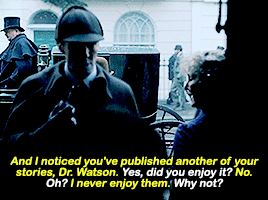
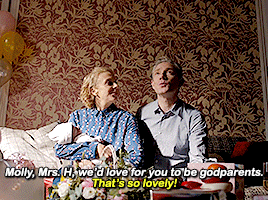
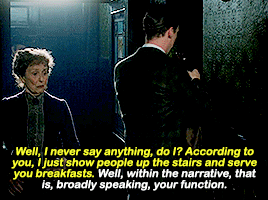
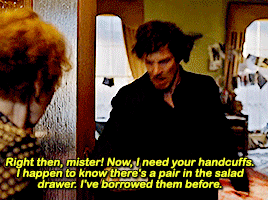
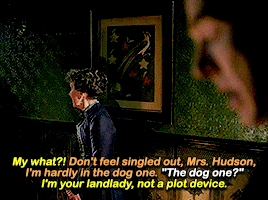
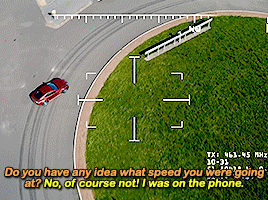
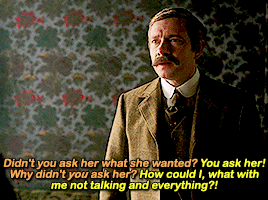
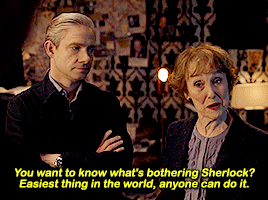
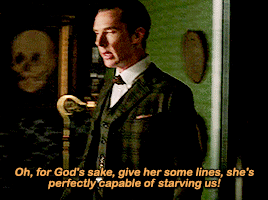
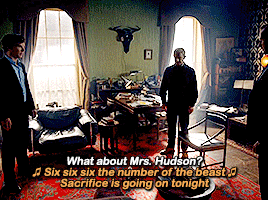
Looking Closer at How The Abominable Bride Foreshadowed and Can Be Used to Chronologically Decode Series 4:
In the opening sequence of TAB, Dr. Watson has a conversation with Mrs. Hudson about the role she plays in his published stories vs. what she really does behind the scenes, unfiltered. Watson says that the role she has in his stories is, within the narrative, broadly speaking, her function.
In series 4, there is no corresponding exchange –– instead, Mrs. Hudson plays a key role in the events of the show. John has her become his existing daughter’s godmother, kidnap Sherlock at gunpoint, engage in a high speed car chase with MI6 and the state, and deduces what’s really going on with Sherlock, leading John to discover Mary’s video message. She also has several particularly over the top moments and funny lines. Sherlock originally asked this of his imagined John, not of the real one, demonstrating just how well Sherlock knows John, and how both of their different but narrated worlds mirror each other.
[Continue below the cut for more ➤]
See also: 10 Revealing Things From The Six Thatchers That Haunt You Late At Night, 10 Revealing Things From The Lying Detective That Haunt You Late At Night, and 10 Revealing Things From The Final Problem That Haunt You Late At Night.
Bonus: The smallest fractal, the biggest lie, and function.
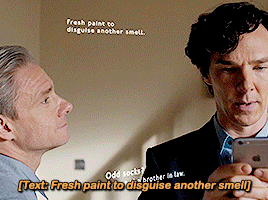
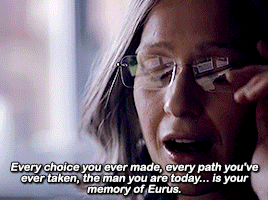
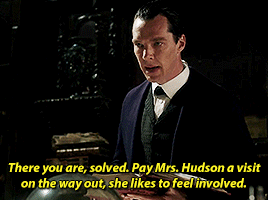
In the original stories, John Watson as the author frequently mentions how he changes details and people’s names in order to protect the people he writes about, if or whenever he’s allowed to publish accounts of Sherlock’s cases at all. Because series 4 has becomes John’s blog and everything in it is subject to his authorship, one of those changes includes the characterization of the people around him, whether he realizes it or not, from the biggest plot inventions down to the smallest inflections in preexisting characters like Mrs. Hudson.
And TAB is aware of the true nature of the original stories from the very beginning, with Mrs. Hudson greeting Holmes and Watson at the door, immediately complaining about how she’s depicted in the stories after Watson asks her what she thought of his latest. “Well, I never say anything, do I? According to you, I just show people upstairs and show you breakfasts,” directly addressing how Watson wrote her in the original stories. Watson is writing these stories for an audience, we’re not seeing them in third person like we normally would for any other detective story, and thus what we primarily know about them comes down to what purpose they serve. “Well, within the narrative, that is broadly speaking, your function.”
The rest of the show has already given her a personality and life beyond Watson’s description in the original stories, brought to life by the wonderful Una Stubbs. John continues this trend in series 4, naming her as the godmother to his fake child in his nightmare marriage with a an assassin who pretended to be a dead girl as a facade in her ultimate goal to work with Moriarty to break Sherlock and thus Mycroft and control the state of England. Because of this, John is naturally embellishing about how happy the affair was, and how much of a role Mrs. Hudson really played. She doesn’t even interact with the baby at all, Molly is the one watching her at the end of TST, and then she’s sent away for two whole episodes. Even in the ending montage in TFP, she still doesn’t interact with the baby.
In TAB, Mrs. Hudson states in refutation to Watson, “I’m your landlady, not a plot device.” But she’s not just a landlady either, she’s more than that. When Sherlock tells John he’s going to stay at the hospital in TRF, John is furious and pleads with him, “Doesn’t she mean anything to you? You once half killed a man for laying a finger on her,” referring to ASIB. Mrs. Hudson repeatedly says she’s their landlady, “I’m not your housekeeper!” despite frequently interjecting herself into their lives, a basic and normal contradiction that exists in her as a person, as a multi-dimensional human being that isn’t conveyed so clearly in the surface text, but is more open to interpretation in the subtext with John as the author, because we can’t completely trust almost anything he says with absolute certainty.
By bringing Sherlock to John’s doorstep in TLD, causing a high-speed chase in the process, she is acting as a plot device for John’s story. John even gets a little on the nose by drawing attention to it:
“Whose car is that?”
“That's my car.”
“How can that be your car?!”
“Oh, for God's sake! I'm the widow of a drug dealer, I own property in central London, and for the last bloody time, John, I'm not your housekeeper!”
As John writes this, he’s even recounting things that he knows about her, like the drug cartel story in TEH (which was foreshadowing his doomed marriage with Mary), but no new information. John does this with other characters too; he changes Sherlock’s characterization so that his method of deduction is all over the place (visions of the future, sudden recollection of evidence, summarizing the case in long monologues), and to be act aloof about John and their relationship, making jabs about him being more useless than Mary, comparing him to a dog in TST. “But then people do get sentimental about their pets,” Moriarty says in TGG. He changes Mary’s characterization to make her a noble wife who never did anything wrong. “Oh, she’s bad, that one. So many dead people. You should see what I’ve seen,” Magnussen says in HLV. Even in her assassin days, Mary was wholesome and all the people she killed had it coming, because she has to die that way in order for the lie to be believable. If he paints her as anything less, the plot falls apart, because it hangs in the balance of her false character arc.
Mrs. Hudson does more in TLD, deducing herself what Sherlock’s real plan is by correctly assigning his behavior over the assumption of his older brother Mycroft, drawing attention to the message with the dagger in it. “Didn't you ask her what she wanted?”, Sherlock yells down to Mrs. Hudson in TAB. “You ask her!” “Why didn't YOU ask her?” “How could I, what with me not talking and everything?!” So Mrs. Hudson gives one of the most important moments speaking in the episode, figuring out what Sherlock wants out of this. “Oh, for God's sake, give her some lines, she's perfectly capable of starving us!” Sherlock says.
The parallels between TAB and series 4 don’t happen because Sherlock told John about everything in his dream and there’s a direct, causal, logical relationship, they happen because (in addition to weaving in the subtext of the canon) they have similar thoughts about the future and can read each other well enough to predict each other’s needs and feelings, along with their own needs and feelings mirroring, even if they haven’t confessed to each other yet. Sherlock doesn’t tell John he dreamt about him suggesting the bride has a twin, but John mentions twins at the beginning of TST because they’re both sharing the same subconscious thought about Moriarty and Mary being a team that’s working together. Sherlock doesn’t tell John about how he dreamt Mary working for Mycroft, but John writes Mary having peripherally worked for Mycroft because Mycroft is in a long-term war with Moriarty for control of England, and they’re still working towards the conclusion that Mary has been working for Moriarty this whole time, still confusing Mary’s true purpose as working for Mycroft.
“Pay Mrs. Hudson a visit on your way out, she likes to feel involved,” Sherlock says to Lestrade in TAB. In TFP, a completely invented and fictional account that’s a false catharsis of and completelty antithetical to the entire show, Mrs. Hudson only appears at the very beginning and end, when they’re still at Baker Street. John writes her being completely oblivious to the complete nonsense with the drone exploding, even explaining that she’ll be safe, because none of it happened. Mrs. Hudson’s role is exaggerated in the previous two episodes, but she otherwise appears in the show all the time, always part of a larger, shared reality that continues whether they’re at Baker Street or not. But in TFP, Baker Street is destroyed and she’s nowhere to be seen and has nothing to do until John pieces reality back together at the very end in order to hide the truth about what happened. And it’s in this episode, followed by her premiere at the end of TLD to obscure what happened to him, that John makes full use of Eurus, a completely fictional person. John has invented entire people before the the plot, like Vivian Norbury, another fictional person who only appears in one scene each at the very beginning and end, but this time the entire story revolves around Eurus instead of Mary.
While all of these changes are most obvious in the most ridiculous aspects of series 4, they all trickle down to every little decision, including those of supporting characters like Mrs. Hudson. In TST while Sherlock is messaging about one of the cases, he types, “Fresh case to disguise another smell”, solving a crime. In the ending montage of TFP, 221b Baker Street is repainted with a fresh coat, and as the scene continues, Mrs. Hudson walks in with a spray can, trying to cover up in a small way the rancid odor that John unleashed, that still stinks to the rest of the audience. Because something is clearly off about this season, and especially this ending, and it can be seen from the smallest fractal to the biggest lie.
#sherlockedit#tjlcedit#johnlockedit#tjlc#sherlock bbc#mrs. hudson#sherlock holmes#john watson#mary morstan#eurus#molly hooper#series 4#the six thatchers#the lying detective#the final problem#gifset#gifs#edits#looking closer at tab timeline
47 notes
·
View notes
Text
Tintin in the Land of the Soviets
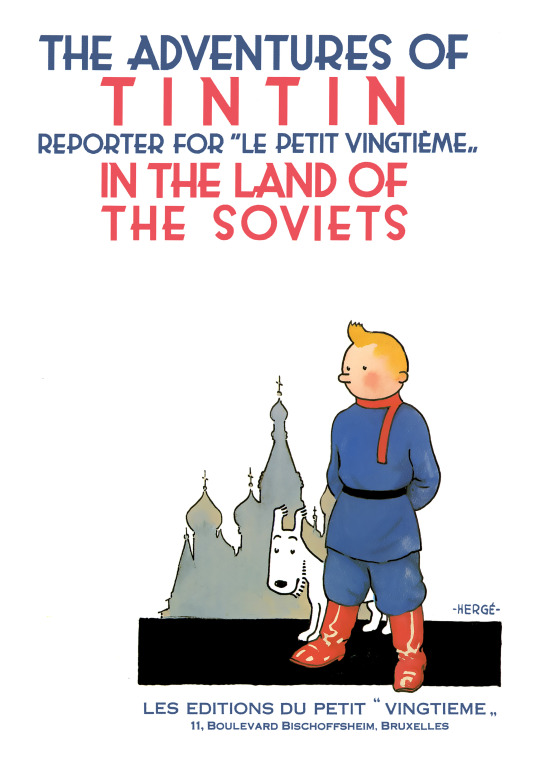
THE ADVENTURES OF TINTIN: IN THE LAND OF THE SOVIETS
1930
BY HERGÉ
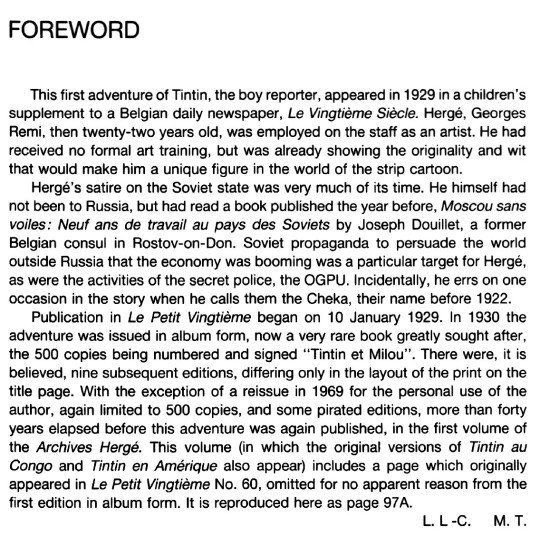
CRITICAL RECEPTION (FROM WIKIPEDIA)
In his study of the cultural and literary legacy of Brussels, André De Vries remarked that Tintin in the Land of the Soviets was "crude by Hergé's later standards, in every sense of the word". Simon Kuper of the Financial Times criticised both Land of the Soviets and Tintin in the Congo as the "worst" of the Adventures, being "poorly drawn" and "largely plot-free". Sociologist John Theobald of the Southampton Institute argued that Hergé had no interest in providing factual information about the Soviet Union, but only wanted to inculcate his readers against Marxism, hence depicting the Bolsheviks rigging elections, killing opponents and stealing the grain from the people. According to literary critic Jean-Marie Apostolidès of Stanford University, Hergé cast the Bolsheviks as "absolute evil" but was unable to understand how they had risen to power, or what their political views were. This meant that Tintin did not know this either, thereby observing the Soviet "world of misery" and fighting Bolsheviks without being able to foment an effective counter-revolution. Literary critic Tom McCarthy described the plot as "fairly straightforward" and criticised the depiction of Bolsheviks as "pantomime cut-outs".
Photograph of a middle-aged man speaking into a microphone.
Hergé biographer Benoît Peeters considered In the Land of the Soviets to be "joyously bizarre" but also clearly Hergé's worst. "One couldn't have imagined a less remarkable debut."
Hergé biographer Benoît Peeters was critical of the opening pages to the story, believing that the illustrations in it were among Hergé's worst and stating, "One couldn't have imagined a less remarkable debut for a work destined for such greatness". He believed that Tintin was an existentialist "Sartre-esque character" who existed only through his actions, operating simply as a narrative vehicle throughout the book. Where Hergé showed his talent, Peeters thought, was in conveying movement, and in utilising language in a "constantly imaginative" way. He considered the story's "absurdity" to be its best feature, rejecting plausible scenarios in favour of the "joyously bizarre", such as Tintin being frozen solid and then thawing, or Snowy dressing in a tiger skin to scare away a real tiger. Hergé biographer Pierre Assouline described the comic writer's image of the Soviet Union as being "a Dantesque vision of poverty, famine, terror, and repression".
Marking the release of Steven Spielberg's The Adventures of Tintin: The Secret of the Unicorn film in 2011, the British Broadcasting Corporation (BBC) commissioned a documentary devoted to Tintin in the Land of the Soviets in which journalist Frank Gardner—who considered Tintin to be his boyhood hero—visited Russia, investigating and defending the accuracy of Hergé's account of Soviet human rights abuses. In an article for conservative newspaper the Daily Mail, Gardner discussed his experience, stating that upon first reading the comic, he thought the drawings crude and the plot improbable. However, during his trip to Russia, he learned from a Muscovite historian that the spirit of Hergé's story was in keeping with what was going on in Russia at the time. The historian confirmed that one of the great tragedies of the 20th century was the wholesale persecution of the Kulak farmers by the Bolsheviks, where "literally thousands perished." First airing on Sunday 30 October 2011 on BBC Two, it was produced by Graham Strong, with Luned Tonderai as producer and Tim Green as executive producer. David Butcher reviewed the documentary for the Radio Times, opining that Gardner's trip was dull compared to the comic's adventure, but praising a few "great moments", such as the scene in which Gardner tested an open-topped 1929 Amilcar, just as Tintin did in the adventure.
SYNOPSIS (FROM WIKIPEDIA)
Tintin, a reporter for Le Petit Vingtième, is sent with his dog Snowy on an assignment to the Soviet Union, departing from Brussels. En route to Moscow, an agent of the OGPU - the Soviet secret police - sabotages the train and declares the reporter to be a "dirty little bourgeois". The Berlin Police blame Tintin for the bombing but he escapes to the border of the Soviet Union. Following closely, the OGPU agent finds Tintin and brings him before the local Commissar's office, instructing the Commissar to make the reporter "disappear ... accidentally". Escaping again, Tintin finds "how the Soviets fool the poor idiots who still believe in a Red Paradise" by burning bundles of straw and clanging metal in order to trick visiting English Marxists into believing that non-operational Soviet factories are productive.
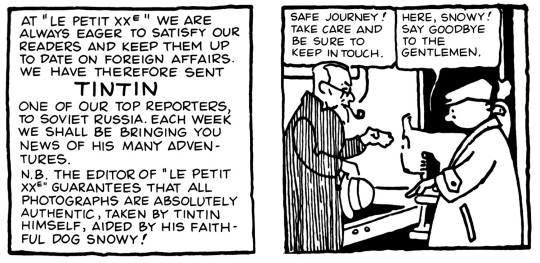
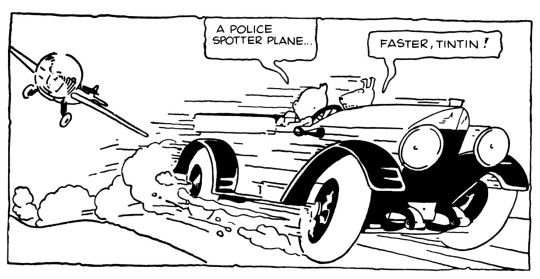
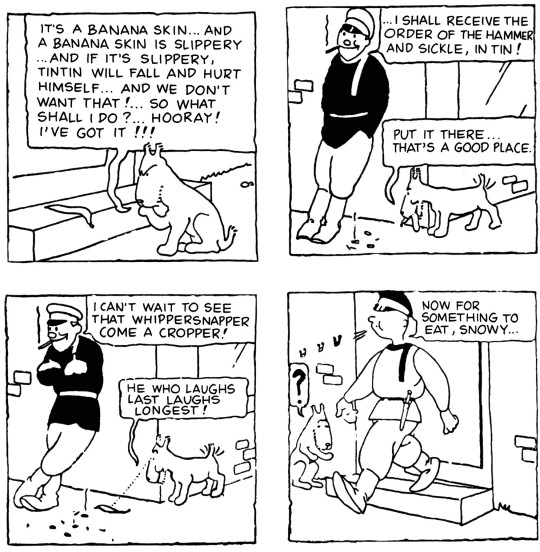
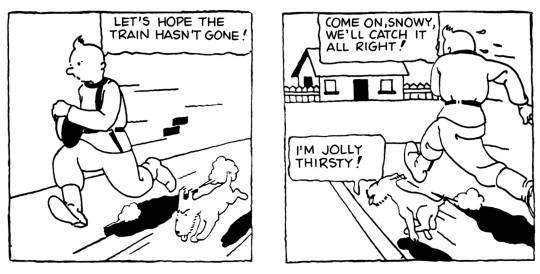
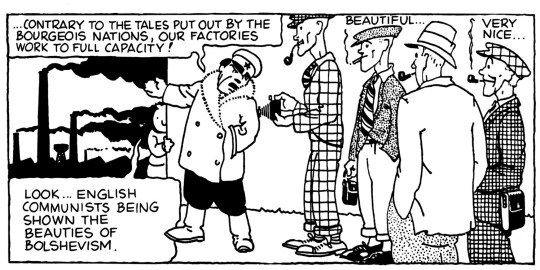
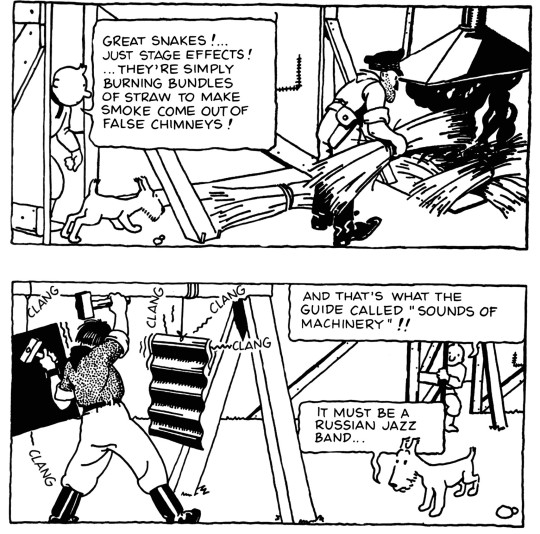
Tintin witnesses a local election, where the Bolsheviks threaten the voters to ensure their own victory; when they try to arrest him, he dresses as a ghost to scare them away. Tintin attempts to make his way out of the Soviet Union, but the Bolsheviks pursue and arrest him, then threaten him with torture. Escaping his captors, Tintin reaches Moscow, remarking that the Bolsheviks have turned it into "a stinking slum". He and Snowy observe a government official handing out bread to homeless Marxists but denying it to their opponents; Snowy steals a loaf and gives it to a starving boy. Spying on a secret Bolshevik meeting, Tintin learns that all the Soviet grain is being exported abroad for propaganda purposes, leaving the people starving, and that the government plans to "organise an expedition against the kulaks, the rich peasants, and force them at gunpoint to give us their corn."
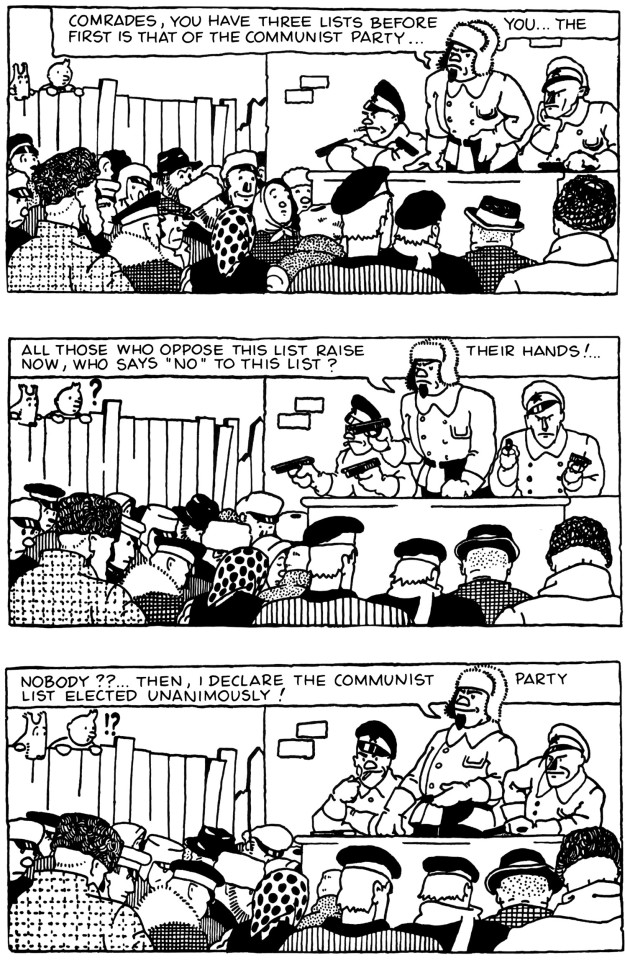
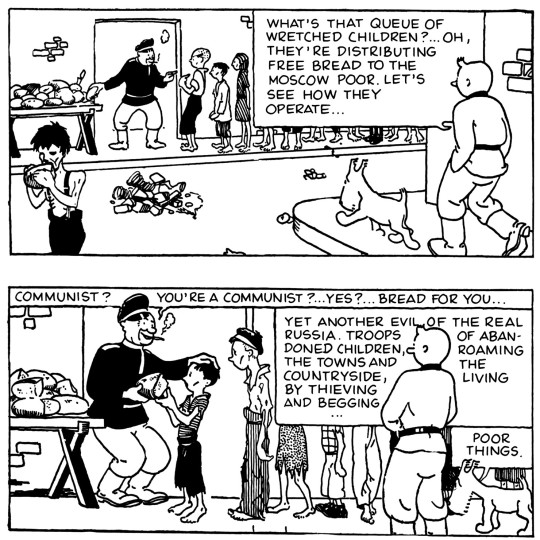
Tintin infiltrates the Red Army and warns some of the kulaks to hide their grain, but the army catches him and sentences him to death by firing squad. By planting blanks in the soldiers' rifles, Tintin fakes his death and is able to make his way into the snowy wilderness, where he discovers an underground Bolshevik hideaway in a haunted house. A Bolshevik then captures him and informs him, "You're in the hideout where Lenin, Trotsky and Stalin have collected together wealth stolen from the people!" With Snowy's help, Tintin escapes, commandeers a plane, and flies into the night. The plane crashes, but Tintin fashions a new propeller from a tree using a penknife, and continues to Berlin. The OGPU agents appear and lock Tintin in a dungeon, but he escapes with the aid of Snowy, who has dressed himself in a tiger costume. The last OGPU agent attempts to kidnap Tintin, but this attempt is foiled, leaving the agent threatening, "We'll blow up all the capitals of Europe with dynamite!" Tintin returns to Brussels amidst a huge popular reception.
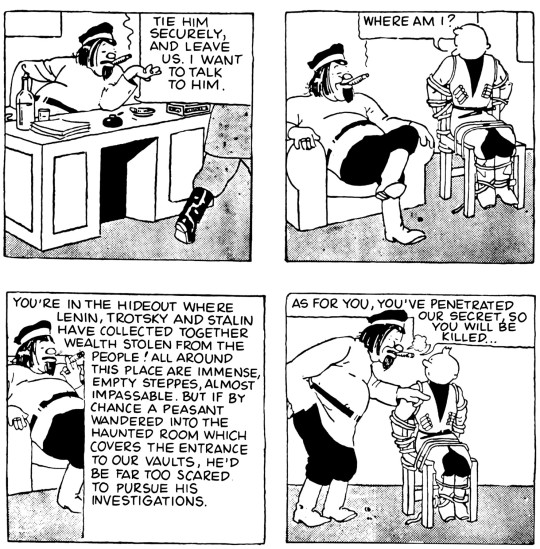
REVIEW
I am used to reading propaganda comics. The american Golden Age is full of racism and nationalism, and it is offending in its bad taste. Now, Tintin in this case was also propaganda in the form of satire, which is actually a very smart way of pushing ideologies. So, people were probably offended by the way the Soviets are portrayed here, and they are correct when they say that there is no investigation about the causes or trying to figure out why they were acting like that. But I can tell you that, coming from the third world myself, where these common practices of communism shaped nations (and kept them from progressing), all the things Tintin sees still happen in the world. More than you can imagine. And we are talking about countries that are part of international organisms. So, while this book may seem “too simplistic” at times, I have no doubt it is realistic.
Also, exploring the causes would probably not fit the publication the comic strip was being published on.
The story, soviets aside, is pretty entertaining and Milou (Snowy) has dog thoughts and dialogues that make him more relate-able.
The style is not there yet. Hergé gets better from panel one til the end. If this is one of his weakest works, I cannot wait to see his strongest.
I give this book a score of 8
4 notes
·
View notes
Note
Character Ask: Trombley, Wynn
Oh, my dude, you are in for a ride because I have CAPSLOCKY feelings about Trombley.
First impression: Creepy, dead eyed, unsouled and whiny
Impression now: Listen, I have NO Patience for Trombley. He is a compilation of all of the WORST traits and I fucking hate it. It’s not the complete lack of empathy that bugs me (though not a positive trait, it is understandable. He is a kid.) It’s the part where he KNOWS NOTHING and is completely uninterested in learning. He’s such an uncurious lump! He doesn’t care! He fucks up and everyone around him is mad or upset or whatever and he’s like….shrug, not my fault, Sgt Colbert I’m going to put this all on your shoulders. And even before that, when Poke is trying to give him the right hat or when Brad is trying to keep him from shooting dogs, he is so fucking sullen. He is SURROUNDED BY EXPERTS and when they try to correct him, he pouts. Fuck you, you entitled manchild. Plus he’s a bloodthirsty manchild and I just hate it and all the time we spend with him he is whiny and complaining and putting blame on other people and it is NOT ENJOYABLE. I get that this is deliberate on the part of the show, and I am not arguing with the function he plays within the narrative, I am just saying that as a character, I have no time for Trombley.
Favorite moment: Nope
Idea for a story: There is a redemption arc available for him, if someone wanted to write it. In my headcanoned GK Star Wars AU, Trombley is Luke, because he starts out whiny and self-important, but he learns self-awareness and finds his empathy and if someone could do that for Trombley, that would be interesting.
Unpopular opinion: TBH I don’t think the fandom has enough Trombley feelings for any opinion to be popular or unpopular.
Favorite relationship: The show does a good job of comparing and contrasting Trombley and Reporter in such a way that points out how even though neither of them knows anything, Trombley belongs there and Reporter is an outsider. I don’t know if that counts as a relationship since it is more meta, but I’m sticking with it.
Favorite headcanon: So Trombley doesn’t care about human life for the sake of human life, and he doesn’t know why everyone is making a big stink about accidentally on purpose shooting kids. And Nate sees that Trombley has made himself even more of an outsider through his refusal to adapt, and decides that is something that needs to be fixed. So Nate sends Gunny to tell Trombley that people are upset not only because of the dead children but also for what this tells them about Trombley as a Marine. They need to be able to trust Trombley to cover his sector and accurately report on what is happening, and if he is sloppy with what he reports, they can’t trust him. And Trombley *does* care about being a good Marine, even if he doesn’t care about other humans (god trombley you SUCK) and that helps him reflect and he’s more abashed and it helps unit cohesion.
This is too long and too ranty for me to do gunny. Especially because I don’t want my annoyance to spill over onto him.
#i know some of you like him#and that is ok#gk is the realm of problematic faves#you get no judgement#but me#personally#i am done with whiny entitled men#who feel like they deserve whatever they want#just because they want it#especially since what trombley want#is to kill people
7 notes
·
View notes
Text
The One Sure Fire Sign You’re Sexist
https://valkurion-after-dark.tumblr.com/post/165079940492/aaaaaand-now-to-start-off-the-day-with-a-rant
Let’s take a look at the mind of the average toxic RWDE poster.
Aaaaaand now to start off the day with a rant before I get down to business. Gonna put this under a read more and if this offends you I’m sorry, it’s just my observations as a fanfic writer and fanart viewer/commissioner.
Which completely and utterly destroys the purpose of a rant which is suppose to be personal and biased. Meaning that you just want people to accept your personal feeling as fact.
Note this isn’t true for every single person, but an overwhelming majority.
Actually, as we will soon see, this is just a symptom of your misandry.
The One Surefire Sign That All The Male Characters In Rwby Suck
There is *one* single MLM ship in the whole fandom that is remotely enjoyed. And you wanna know what that ship is?
Seamonkeys (Sun x Neptune)
Ah yes, not like Martial Arcs is a thing.
And not like the show is advertised around girls, gay and bisexual guys would be the ones with the investment in a mlm ship and the a lot of parts of the fandom are rampant with misandry and not like Arkos, Black Sun, White Knight and Lancaster is a thing.
You wanna know why people even ship it? Because they VAs are best friends, and thus, the writing was heavily influenced to have both characters magnetised to each other for the entirety of Volume 2.
And here’s you not knowing what you talk about: People ship the thing originally to get Sun away from Blake and it just grew beyond that so the very basis of your argument is flawed.
The Season even started with Sun and Neptune as best bros, and they stayed that way until Miles dive-bombed Sun;s character further into the stinking pit of shit he was already in during Volume 4.
And yet Black Sun is one of the most popular ships in the fandom, near rivaling Bumbleby and Sun often tops in people’s Top 10 lists of their favorite RWBY characters so Sun is in fact a good character. So he’s ki8nd of a counter example of your point.
But this IS an example of your Misandry: Calling Sun shit for no reason other than he’s male here and blaming Miles despite Kerry being head writer and Gray being head animator.
Whereas almost every single popular ship is either Yuri, or just plain hetero (thanks to Arkos and Renora) only one single MLM ship floats over the rest, and that’s because it’s the only one the writers remotely set up because the VAs are best friends.
Maybe because the fandom melts down whenever a male character gets focus because they aren’t female. And you do realize that by counting mlf ships as against males is showing you don’t give a shit if there are good males or attribute them automatically to females. And then we have you ignoring Black Sun which is more popular than both of them just to enforce your narrative.
Just another reason that Rwby has been let down more than America during the last election, or more so than the Paralympic Comunity after the Trial of Oscar Pistorius.
Yeah...That just kind of confirms that You’re not a fan of the show combined with the fact you have gotten so many things wrong about the fandom.
And, just to top it of, it is yet *another* telltale sign that Rooster Teeth in general does not give a toss about LGBT+ people, as if we didn’t already know that from their latest attempt to wrench money from out already broke paws.
Which is why Camp Camp has three gay males (The two agent Millers and the Bully), four gay characters in RvB (Caboose, Donut, Agent Iowa and that Charon chick from Season 14) and a gay female protagonist of Day 5. But then again, that shows you just care about bitching instead of the facts.
Seriously fandom, wake the fuck up. The creators of your once beloved show, does not give a fuck about you or what you want from their ‘groundbreaking’ cash cow that is Rwby, sadly the show is doomed to now be milked for eternity.
Not like they SHOULD considering how certain parts of the fanbase has treated them and since we have a lack of RWBY spin-offs with only 1 that has massive demand and just ordinary merchandise.
Of course, by what you are saying, you think that the RWBY fanbase is comprised mostly LGBT guys. Which is most certainly not the case.
And THEN we have the fact that this isn’t about Male characters in RWBY and you’ve given no examples of a male actually being bad which to me, seems more like you’re whoring yourself out for notes and attention.
If you genuinely care about those characters, boycott the show and show the company you actually do not approve of how Miles is using the platform to float is god complex ridden ego and taking money baths with the profits you’re already giving him.
Ah yes, god complex ego...in which he talks about how he’s not the greatest writer in the world and how he thinks he doesn’t match up to the rest of his team (https://www.reddit.com/r/RWBY/comments/5vp164/dude_miles_we_on_rrwby_appreciate_everything_you/de4b7is/) or when he talks about how he is a bit ashamed at RWBY’s rough beginnings and how he needs to improve (http://blitz.arc.unsw.edu.au/2017/interview-miles-luna-of-rooster-teeth/).
Ah yes, profits so big that their company is still dwarfed by about 90% of their competition....
Totally not you being a misandric asshole.
7 notes
·
View notes
Text
GoT Re-Watch: Fine-Toothed Comb Edition
Well, an extra week’s break has given me the time I need to tackle one of the season’s longest episodes.
6.04 - Book of the Stranger
(1:53) Here is a shot of Longclaw, in focus. Someone’s in the background (Edd) kinda messing with some stuff.
(2:04) Here is where Edd picks up Longclaw. So many places where two or three seconds should be trimmed off the shot (if that shot even has to be included at all). It doesn’t take eleven seconds for viewers to get their heads around what’s happening here visually or aurally.
(2:15) And here’s where we start on the actual action of the scene - Jon packing. Twenty seconds of Edd futzing around with Jon’s stuff later…
(2:56) I think this exchange of dialogue is pretty good, actually, showing a genuine and warranted “fuck everything” mentality in Jon and reminding the viewers what the stakes of that “fuck everything” mentality are.
(3:13) Note how Brienne’s in the lead and the camera’s tracking her. Tormund’s reaction shot to Brienne also gets established over Sansa. Sansa, almost as much of an afterthought as Bran.
(3:48) And yet in spite of that, this moment where Jon and Sansa reunite is done very well. Especially considering that Jon and Sansa haven’t even shared a scene in the books. Did Jon even find out that Sansa had been married off to Ramsay in the show last season? Because in ADWD he sure knew that “Arya” had been married to Ramsay, and that affected the plot.
(5:05) Now the problem is that the writers have to establish, very quickly, what the dynamic between these characters was. Even though Jon and Sansa have never shared a scene in the books, we’ve still seen them think about each other and we know that even though Sansa called Jon her half-brother at Winterfell, she loves Jon, and Jon loves her. In isolation, I think it would be perfectly fine to have Sansa establish the dynamic by apologising for not being an A+ sister to Jon (I’d prefer if the “awfulness” Sansa is repenting for was described, so we can see the class dynamic and discrimination in play, rather than leaving it for the audience to go ‘oh she was a brat’). But as usual, this does not and cannot stand in isolation. We have multiple examples of women apologising for or regretting not being the perfect female relative - just off the top of my head we’ve got Catelyn, Selyse, and Cersei, and now we’re adding Sansa to that list. The only time I can think of a male character doing the same is Jaime’s trip to Dorne in season five, and I think we’d all be better off forgetting that.
(5:20) One of the things that does make this better is that Jon admits to one of his own childish character failings.
(5:44) And, of course, it’s nice to see these two characters enjoying each other’s company. I don’t suppose the writers will shoehorn in some “tension” and “rivalry.”
(6:29) It’s right here, when Sansa’s talking about enlisting the Free Folk to fight the Boltons, that I’m really feeling the rehash, and how it’s messing with the broader structure of the entire series. By ADWD, we’re steadily building up to a confrontation with the White Walkers. Jon’s plot in particular is like looking at a big bank of dark clouds building up on the horizon. What’s happened here is that the writers throw a bone in the general direction of the White Walker plot, but then leave it so that Winterfell can finally be retaken - but by characters they (supposedly) like better than Stannis. The action in the Northern arena goes backwards in order to dispose of Stannis and promote Jon, at the cost of building tension on the Northern border. I mean, it was one of the things that ‘Hardhome’ did right, showing the White Walkers in action, and now they pretty much disappear as a motivating force for a season. The show made this mistake in season four. It’s worse to make this mistake again in season six.
That said, at last someone points out that it matters to the broader conflict just who holds the position of Warden of the North.
(6:43) Sansa just told Jon that Arya, Bran and Rickon are all alive (she doesn’t know Jon knows about Bran and Rickon), and he doesn’t react. Hell, she doesn’t act as if this is a thing he doesn’t know. Maybe she told him earlier - but why not show Sansa’s joy at getting to tell Jon that their younger siblings are alive, and Jon’s at learning this?
It’s because the writers don’t care about depicting the Starks as a family unit. Creating tension from loving relationships, where the interpersonal stakes are so high precisely because the parties involved love each other deeply, is not something the writers of this show excel at (see the changes to Catelyn and Robb’s relationship, the neglect of Jon’s with Ned, the lack of feeling between Sansa and Arya, and as always, who the hell is Bran); they do far better where people are in direct conflict driven by hatred, resentment, or rivalry.
(6:56) Nobody made Jon hang Olly. Indeed, I would argue strenuously that if Jon intended to quit the Night’s Watch (which his comments indicate was his plan from before the hanging), he should have left it for the next Lord Commander to deal with.
(7:20) Promising signs for Sansa’s characterisation! Asking for help but not dependent on it, confident and assertive, we’ve even seen here signs of book!Sansa’s intelligence.
(7:41) Mel here calls Jon “the prince that was promised.” Which is a very definitely Targaryen prophecy, rather than a R’hllorite one. Eh, I’m sure they’re all the same and carry the same meanings to these very different people.
(8:03) Davos asks about Stannis. Melisandre says that there was a batte. Davos follows up with a question about Shireen, recognising that “there was a battle” doesn’t explain why nobody tried to get her clear of it.
(8:11) Brienne walks up to Davos and Melisandre discussing the issue. She interrupts, actually. When Davos attempts to introduce himself politely, Brienne responds with rudeness and hostility.
(8:56) Brienne then tells Davos and Melisandre that she “executed” Stannis (bullshit, that was revenge murder) and walks off. She had no purpose in this conversational detour but to cause them pain. While I can understand how Brienne got to “red priestess = likely source of blood magic that killed Renly,” I’m not sure why she wants to hurt Davos. Nor actually why I should think this character is admirable.
In the meantime, Davos forgets to press the point about Shireen. Eh. It’ll keep.
(9:01) Cut to Robin Arryn here. He’s attempting to aim an arrow.
(9:09) Cut away from Robin Arryn’s attempt to aim an arrow. Eight seconds, just of Robin attempting to aim. Earlier seasons have shown us children practicing archery, and they didn’t need eight seconds of aiming to establish skill or lack thereof; they cut straight to a conspicuous lack of arrows in a target, unless also developing relationships between characters.
(10:15) Littlefinger here lies about the plan to marry Sansa to Ramsay and engages in a little standoff with Yohn Royce. So he knows that this would go over like a lead balloon in the Vale and has to distance himself. This is before he’s certain that Ramsay raped Sansa. Truly, the Ramsay-Sansa match was a brilliant plan brilliantly executed.
Not to mention this is a really crappy lie. How do you get from Royce lands to the Fingers? How would a “large party” of Bolton men get from Winterfell to the relevant route? Undetected, no less? This story stinks to high heaven. It’s ironically consistent with book!Littlefinger that he comes this close to being rumbled by a transparent lie and has to sic armed men on someone. Unlike the books, however, this is not portrayed as Littlefinger failing, but at Littlefinger being very clever. Yay for winning the staredown! Don’t think about whether the staredown was remotely necessary!
(11:37) Someone was really proud of the “the wars to come” phrasing. By this point, they should not be proud.
(12:07) Littlefinger has friends in the North who tell him Sansa has escaped Winterfell. First, his friends told him that Sansa has escaped, but did not manage to tell him what sort of person Ramsay was? Second, I believe this is the last we’ll hear of Littlefinger’s friends. Spy networks are only for exposition.
(12:35) Last season, Littlefinger was whisked down to King’s Landing, ostensibly to obtain Cersei’s permission to get the Knights of the Vale to ride against those treacherous Boltons (but really just to deprive Sansa of allies so she could spend the season being raped). Here in this scene, it seems Littlefinger does not need Cersei’s permission at all. And later on, we’ll see that this Vale mobilisation could be accomplished without having this scene with Robin and Royce at all. It’s a waste of time (upwards of seven minutes of screentime spread over two seasons), and it still fails to patch the massive plotholes the Ramsay-Sansa plot opened in the first place.
(13:02) This is probably the best writing for Tyrion we’ll see all season, as Missandei and Grey Worm attempt to tell him that he’s got the wrong idea about the nature of the enemies they’re facing. At this point, the narrative is allowing for the possibility that Tyrion’s wrong, and allowing for the possibility that Tyrion’s personal flaws and background are blinding him.
(13:18) “How many days were you a slave?” “Long enough to know.” “Not long enough to understand.” Yep. Best exchange we’ll get in this part of the story. External problems linked to Tyrion’s internal thought processes. There’s conflict, character and military.
(13:28) Tyrion drinks: 1.
(14:35) In other ways, this is a deeply confused scene. As with Mossador last season, we’re supposed to think that Missandei and Gray Worm have a point, but we’re also supposed to be thinking they’re aggressive and radical, compared to the diplomatic, moderate Tyrion.
The content is also strange, as the Masters tell Gray Worm that he’s not a free man, he’s still a slave…after the scene opened by recognising that when Tyrion went from slavery to the top of the Great Pyramid of Meereen, that was a marked change in fortunes indeed. Tyrion also says that he’s not here to change the world…in a meeting between ancient slaving powers and, amongst others, two former slaves, appointed representatives and trusted confidants of a fiercely anti-slavery queen. If Tyrion has missed that the world here has changed dramatically and/or cannot deal with the fact appropriately in negotiations, he’s not cut out for the position he’s holding.
(14:45) Not to mention that Tyrion definitely doesn’t understand slavery. “You don’t need slaves to make money.” That’s the key issue here to be sure.
(15:50) And then Tyrion rings a bell to summon sex workers 1, 2, and 3, to entertain the Masters. Grey Worm going from slave to commander of an army in service to a cause he believes in = still slavery. Tyrion ringing a bell to summon sex workers to entertain slavers = freedom!
These women aren’t given a voice. They’re keys dangled in front of the Masters to distract them, exploited to gain assent for Tyrion’s seven year plan. All the worse if these women were formerly slaves themselves.
(17:11) Again, the writing in this episode acknowledges that Tyrion’s plan is hardly uncontroversial, and that his opponents amongst the former slaves have every right to be pissed as hell. The problems mostly arrive in subsequent episodes.
(17:32) I say ‘mostly’ because there’s this bit, which I don’t think the narrative quite came to grips with. Grey Worm and Missandei were not ‘included’ in this negotiation in any meaningful sense. The opening makes it clear that Tyrion did not inform them that he was so much as asking the Masters to negotiate. The reaction shots make it clear that Missandei and Grey Worm had no idea about Tyrion’s seven-year plan. Instead, he brought them into that room without warning, did not consult them or respect their opinions or wishes, and now he’s using them as a prop to get out of a jam with the former slaves. And while the writing allows that Tyrion might be wrong on content, it’s less willing to examine the fact he’s treated Missandei and Grey Worm like absolute crap. We get one line from Grey Worm (next scene), and then we’re back to “is Tyrion right or wrong to attempt a peace?”
(18:24) Which culminates with Missandei quoting Tyrion.
(19:04) Grey Worm going on the record, saying Tyrion is wrong, and explaining why. Tyrion brings out the argument from self-interest, Grey Worm says it’s not relevant. These scenes actually have content and conflict in them!
(19:53) Jorah and Daario made it out of Ireland!
(20:21) Episode 6.01, two men discuss Dany’s pubes and the prospect of raping her. Episode 6.03, Dany is forcibly stripped. Episode 6.04, we get another two men discussing sex with Dany, as a form of one-up-manship. Girl power.
(21:46) So the plan is to sneak into the city after dark and rescue Dany. Jorah mentions that they can pretend they’re traders from the western market if they’re caught. You can see the cultural preconceptions at work in the writing staff. Jorah and Daario are white! They will be instantly noticeable in this place! So they need to be very sneaky indeed. Truly it is their only option.
Vaes Dothrak is a big damn place. It supports two sizeable markets and attracts trade from all over Essos. Right now it’s even busier than usual due to the meeting going on. The Dothraki are not a monolith, nor do they have a hive mind. Jorah and Daario could walk right in pretending to be merchant guards, purchase some hair dye, and attempt to smuggle Dany out through this very crowded city.
(22:20) Jorah tells Daario not to worry, his infected skin did not make contact with Daario just then! Daario reacts not with horror and concern (‘cause they’ve been travelling together for a length of time and even if they’ve never touched, they’ve probably touched things the other has touched), but with “that sure is a nasty disease you have there, Jorah.”
(22:58) Ambiguous consent: 1. The public sex here is books vs show in a nutshell - GRRM uses the lack of taboo about public sex to hit that familiar “horsey barbarian tribe” note, then links it to to broader Dothraki cultural traditions (“all things of importance in life must be done beneath the open sky”). The show’s stuck to “horsey barbarian tribe.”
(23:16) Sneaking through the Dothraki camp with all the skills of Solid Snake under a cardboard box.
(23:36) And of course, they’re immediately caught and their lies fall flat (corollary of that Unspoken Plan Guarantee; if a character explains their plan, it can’t be allowed to work).
(24:23) Deaths: 1. Daario kills one of those two Dothraki guys.
(24:43) Deaths: 2. Daario kills the other Dothraki guy.
(25:03) “If they find a body with a stab wound, the whole city will be looking for us.” The no-spilling-blood taboo is so strong that a massive manhunt will start if spilled blood is discovered.
(25:24) …so Daario hits the body repeatedly with a rock. I think he’s missed the point. The stab wound isn’t the problem, the spilled blood is the problem. We’re dealing with some smart guys here.
(26:04) “The khals depend on us for our wisdom.” Yeah. Sure they do.
We keep going over the same points in Dany scenes. The Dothraki think that Dany should join the Dosh Khaleen. Dany does not want to join the Dosh Khaleen. If she does not, and she finds no other way out, then Dany will be raped. Three times now we’ve had more or less this discussion.
(26:34) How long has Dany been here, again, if this is the first time she’s gone to the toilet?
(27:17) Dany does not have much of a reaction to seeing Daario and Jorah. From her reaction, you’d think she was expecting them to show up.
(27:32) Apparently these three will never be able to leave Vaes Dothrak alive. So I guess that’s still a no on covering and then dyeing her hair to make herself less immediately noticeable and sneaking out in these just-established-to-be-multi-ethnic crowds.
(28:32) Mentioning these shots of someone (Margaery) walking through a building because this is one of those occasions where including those shots works! Margaery doesn’t know what awaits her at the end of this short trip, so not skipping straight to it effectively builds a bit of tension.
(29:05) The High Sparrow is a big supporter of the union of faith and crown…he just opposes all the trappings of the crown on a theological basis. I’ve been saying that this guy does not cohere into a single comprehensible character. Sometimes he’s a ruthless power-seeker, other times he’s a religous fanatic (with anachronistic ideas).
(29:05) In this story that’s supposed to be about the evils of seeking wealth, the High Sparrow tells us he was a skilled tradesperson. He put effort into learning his craft, and effort into making quality goods, and then people paid him correspondingly higher prices for the effort and skill he put into those goods! How disgusting.
(31:39) “And I saw it with perfect clarity. I saw what my sins were. The gold I had, the wine I drank, the women I used, my ceaseless struggle to maintain my position…” and from this somehow the High Sparrow has come to the conclusion that it’s not treating people like objects and power as a game with money as a score that’s a sin, but gay people.
And despite Jonathan Pryce’s best efforts, all I can think of is, “You wanna know how I got these scars?” The lack of rhyme and reason fits much better.
(32:34) Margaery’s said barely anything, but the High Sparrow is changing his position. Mostly, that scene was an excuse for a monologue.
(33:11) While this is a touching scene of two siblings caring for each other (two such in one episode? What’s going on?), this is all we’ll see of Loras until he’s scarified and then blown up.
(33:48) Loras’ comments here imply that he’s confessed to what his torturers want him to confess to, and they’re torturing him anyway. Because he’s gay. Nothing but victimisation for gay men this season.
(35:10) Pycelle starts leaving. The joke is that he’s very slow, but it takes him seventeen seconds to leave the room. More than long enough for us to get the “he is old and very slow” joke.
(36:20) Cersei says things like “Margaery’s safety is paramount,” clearly not caring if Margaery falls down the stairs and breaks her neck, but equally, she puts those personal feelings to one side and acts to try and check the High Sparrow’s power.
The structure of this scene is a lot like the one with Varys and Vala last episode. We waste time on some obvious “the High Sparrow is a dangerous man!” “yes, Tommen, the High Sparrow is a religious extremist in a powerful position!” sort of stuff (at least it’s not “people deserve torture” is all I’m saying), then cut away right as the scene gets to the point. Which is then summarised for us in the subsequent scene.
(38:18) In this discussion of what power Cersei has, still nobody has mentioned that Cersei’s the Lady of Casterly Rock.
(38:33) Cersei’s trial is apparently in a few days. What are the charges? *shrug* Besides that, apparently Margaery’s being made to do a walk of atonement. So again we see that the writers understand that the walk of shame is misogynistic, but they don’t understand how it’s misogynistic, nor the broader patriarchal society in which it fits. Perjury is not a gendered crime. It has nothing to do with sex.
(39:00) So the plan is, bring in the army. That’s book!Mace’s plan too. But they’ve explained the plan, so now we know it can’t work. Unfortunately, this is a solid plan which, if the conspirators were halfway careful, should work. It works in the books. The High Sparrow hands Margaery over to the custody of a trusted Tyrell bannerman. The solution to this problem, as we’ll see later, is instead to make sure the conspirators do not behave halfway carefully.
(40:04) Kevan says, the Sparrows have many friends in the city. Sure was nice they packed themselves into the one sept to watch Cersei’s trial then, wasn’t it! Kevan literally says, “we’ll have civil war.”
(40:29) Bamf! Theon approaches the Iron Islands. He’s ‘needed’ in that plot. (Actually, the showrunners have no idea what to do with him.)
(40:51) Theon enters the room here. The set is very badly lit, so it’s not as though we’ve got a visual feast on our screens.
(41:10) Theon reacts to Asha’s presence here. That was twenty seconds of Theon walking maybe two metres.
(41:54) In an episode that gave us the Jon-Sansa reunion, and the Margaery-Loras reunion, we also get the Theon-Yara reunion, and one of the first things out of her mouth is “men died trying to rescue you!” Starts victim-blamey, continues victim-blamey.
(42:04) Man called ‘cunt’: 1.
(42:10) Yeah, like, Yara says Theon “betrayed” her for being too traumatised to participate in his own rescue, linking it to the idea that he was a spoiled child, and making sure he understands that “you were my brother” is past tense. Nice person, is Yara. For this, Theon was evicted from the Northern plotline.
(43:25) Cut to Ramsay peeling an apple here. He’s not very good at it. There’s a lot of apple coming away with the peel.
(43:48) Osha was dragged into this room by guards. Ramsay says “they’ve cleaned you up nicely.” Osha did not decide to come into this room or how she looked when she was brought there. More sexual victimisation of women in this plot, fantastic.
(45:25) Ramsay makes it clear that he intends to kill Osha unless she gives him something he wants. (Spoiler alert: he intends to kill her anyway, since there’s nothing she has he wants.)
(46:21) Deaths: 3. Ramsay kills Osha. It took just under three minutes to get us to this point. Nothing of value was added, since we already knew Ramsay was evil, and we get treated to a further fifteen seconds after this of watching Osha twitch as she bleeds out.
(47:43) Did Sansa just say there are more important things than food? In ASoIaF? That seals it. Now we can be absolutely sure that this is not an adaptation true to the spirit of the original.
(48:21) Even the way this version of the Pink Letter opens shows the differences between show!Ramsay and book!Ramsay. Book!Ramsay’s letter is me, me, me. I want, I want, I want. Between every line is avarice and insecurity. Show!Ramsay opens and closes with politics, complaining about the Free Folk first, and finishing with an assertion that he’s the Warden of the North. Also, show!Ramsay is a terrible, terrible writer. The repetition of “come and see” is just not working. It reads more like blank verse than it does a threatening letter.
(49:11) “You will watch as my soldiers take turns raping your sister. You will watch as my dogs devour your wild little brother.” Ramsay put this to paper. If anyone at this table was thinking straight, they’d take this letter, seal attached, and show it to every Northerner they meet. The Lord of Winterfell, everyone! Promising to rape Sansa Stark and kill Rickon Stark, written right there in his own hand.
(49:11) One smart person on screen at a time. Since it’s Sansa’s turn to show off what she knows, Jon has been forbidden from bringing a brain cell to the table.
(49:53) You know what they could have shown Sansa do last season? Gather exactly this sort of information about Ramsay’s troops and resources. Instead she sat around Winterfell doing nothing except being raped.
(50:16) Sansa here proposes that Jon takes the lead when it comes to the army recruiting. It’s not necessarily a bad idea even given Jon’s bastard status. She seems fine with him being the public face…now. She also says that the Northerners are loyal to the Starks. Shows what she knows.
(50:49) Here we see that the Dothraki taboo against spilling blood in the sacred city is every bit as strong as the Westerosi taboo against kinslaying.
(51:03-5) Abs & pecs: 1, 2, 3.
(51:44) Yay! More sexual threats against Dany!
(53:17) I count thirteen people in this shot.
(53:40) Dany’s argument for leading the Dothraki is purely from force. What makes the khals small men is that they are only raiding small villages. No mention of building a better world (even if that means fire and blood), just “eh, you’re small potatoes in the infliction of violence stakes.” Girl power!
(54:13) Woman called ‘cunt’: 1.
(54:32) That dirt floor caught fire surprisingly well! And headed straight for those fine gentlemen.
(55:01) It’s implied that Jorah and Daario barred the door to the temple of the Dosh Khaleen. Seems like they could sneak around this city just fine.
(55:22) Deaths: 16. Dany kills thirteen khals.
(53:34) Abs & pecs: 4.
(55:47) The Dothraki gather around their burning temple and react with absolute silence. Nobody starts getting water. Nobody’s crying, nobody’s screaming, they’re all just standing around waiting blank-faced because they know they’re extras in someone else’s story and they don’t matter.
(56:05) Boobs: 1. Meant to show female power.
(56:15) White woman burns down temple belonging to a religion consisting mostly of brown people = girl power! And the Dothraki monolith, getting their cues from the hive mind, bow to this woman they’ve been calling a witch for the past few episodes.
(56:40) The white guys Daario and Jorah get to stay standing as they move through a sea of unmoving, unreacting Dothraki, and then take a knee rather than prostrating themselves.
Guess the writers really didn’t learn from the controversy after the ending shots of season three.
Game of Numbers S06E04
Deaths: 16. Daario killed two Dothraki, Ramsay killed Osha, and Dany killed thirteen khals.
Boobs: 1, meant to show power as well as desirability.
Abs & pecs: 4. All Dothraki, of course.
Sex workers: 3.
Consensual sex: 0.
Ambiguous consent: 1.
Woman called ‘cunt’: 1.
Man called ‘cunt’: 1.
Tyrion drinks: 1.
#anti got#fine toothed comb edition#cw: violence#cw: rape#how am i supposed to take ramsay seriously if he can't peel an apple#season six
51 notes
·
View notes
Text
Secret War: Upon Blood Sands- Chapter 1
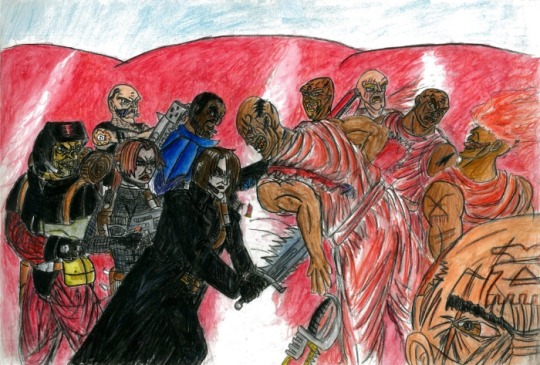
A sequel to my 40k fanfiction Secret War.
Link to chapter 1- http://ben-j-man.tumblr.com/post/180097372453/secret-war-chapter-1
After his organization is hired to hunt down an influential ganger on the Hive world, Omnartus. Attelus Kaltos is embroiled deeper into the complex world of the Assassin. This is the job which will change him, for better or for worse, forever more.
‘I am not a partier; I am an assassin who kills people for a living. And being the dangerous job it is and that I would quite like to live past my twenties, I spend every waking hour for training. Making sure I have the necessary skills to live to see the next day.’ -Attelus Kaltos
Bursting from the seams with action, intrigue, suspense and full of twists and turns. With a character driven narrative which delves deep into the mind torn asunder by war as he tries to find purpose in the grim-dark universe of 40k where there is only war.
A Sanction for Sanity: Chapter 1 link a prequel
http://ben-j-man.tumblr.com/post/181441697383/secret-war-a-sanction-for-sanity-chapter-1
"This is accurate?" asked Attelus Kaltos as he looked up from the data slate, his hazel eyes wide with surprise.
"As much as it can be," said Interrogator Arlathan Karkin who reclined back in his seat, smiling.
They sat in Arlathan's office on the Audacious Edge, the room was large, a good fifteen by thirty metres. The walls made of shining adamantium and Arlathan's desk was inbuilt with an advanced cogitator. A very long Nalwood cabinet sat against the right side wall, keeping Arlathan's liqour bottles.
ge collection of Amasec and other alcohols. Behind the Interrogator was a window taking up the entire width of the office, allowing a good view of Scintilla, the sector's capital world below. The smog covered hive world reminded Attelus unnervingly of Omnartus.
Shit, it'd been three years, three frigging years since the destruction of Omnartus. So much had happened since then and yet so little, Arlathan's promotion as Inquisitor Enandra's Interrogator, the death of the Space Marine chapter responsible, The Destruction Inculpators and Attelus' ascension to master assassin by Glaitis' old cult.
It'd taken Vex six months to decipher the data downloaded from Taryst's cogitator, and Attelus had travelled far and wide, investigating into the leads it gave. Adelana working with him as his apprentice. But all of it had been for nothing, no true clue of Etuarq's whereabouts.
Until now, perhaps.
"And it'd been seven months since it'd occurred?" Attelus asked, trying to keep the anger from his tone.
Arlathan shrugged, looking at Attelus with weary eyes. Much had changed, Arlathan now sported an impressively thick, neatly kept beard and his once pitch black hair now speckled with bits of grey. His pale skin, marked with scars, two crossed on his right cheek and, one ran from his brow onto his left cheek. Scars said given to him by the traitor Inquisitor, Devan Torathe on the bridge of the Imperial Crusher, so long ago.
What had gone on there, Attelus still didn't know. Arlathan and Inquisitor Enandra seemed determined to never talk about it. Something which he didn't like, but had to respect.
At the thought of scars, Attelus absently touched the huge, ugly black scar just under his left eye. The scar he still refused to have covered by false flesh unless the job needed it, instead electing to hide it underneath a thick fringe of brown hair.
"You know more than anyone how slow information in the Imperium of Mankind can move," said Arlathan. "This occurred in the Gothic Sector, way to the galactic south-east, we're bloody lucky we received it this soon."
"Of course we were," Attelus sighed, placing a palm over his face.
"Let me have a look," said Karmen Kons as she got up from one of the couches and approached.
Attelus smiled and handed it to her. Karmen's attractive features didn't smile back. She wore a black bodyglove, her shoulder-length blond hair dead straight and parted in the middle. She was truly attractive, beautiful, perhaps. Her face heart shaped and high cheek boned. Without a word, she took the data slate and began scrolling through it.
"Taryst's records indicated a tenuous at best connection," said Attelus.
Arlathan raised an eyebrow, "to general Tathe? Yes, I know you're unwilling to pursue this thread. They are from your homeworld, they were your heroes as a child, Estella's too."
He furrowed his brow and looked pointedly at Karmen, she ignored him continuing to read the data slate.
"You've been avoiding it," said Arlathan. "But now you can't afford to any longer. A world was put to the sword at general Tathe's behest, Attelus."
"The information is lacking," stated Karmen. "Doesn't even say the world's name, nor even where it is."
Arlathan sighed, "that was beyond our accessibility, that information is classified. Vermillion level."
"But it did happen?" said Attelus.
"Do not know, the information was taken from the Gothic sector's Inquisitorial data banks by one of our long-range operatives, but it still seems worth investigating," said Arlathan. "The Elbyran contingent is taking part in a campaign subduing worlds still held by the archenemy in the Orar subsector since Abaddon the Despoiler's 12th Black Crusade. With the sector highly weakened by Abaddon's forces, they've been importing Imperial Guard regiments from other sectors to help."
"Where are they now?" Attelus asked.
"The last we heard, the Munitorum had sent them to retake the mining world of Carkeath, in the Savath system," said Arlathan. "That was a month ago, but there were problems."
"And what are they?" asked Karmen, looking up from her dataslate.
"A day after they were scheduled to arrive, the system was cut off by a freak warpstorm," said Arlathan. "We know that the Orar astropaths received a message from the invasion force just before the system went dark..."
"And let me guess," Interrupted Attelus. "The contents of that message too was Vermillion level."
Arlathan nodded.
"Isn't that a little strange," said Karmen. "Only bits and pieces of that information being classified."
"All of it is classified," said Arlathan. "Our agent isn't high enough on the totem pole to be able to access just the Vermillion level encoded information."
"And fair enough too," agreed Attelus with a shrug. "But Karmen's right. It is strange. Why not all of it being Vermillion?"
Arlathan smiled, "does this stink as much to you as it does me?" he said.
Attelus smiled and raised his eyebrows, which said, 'of course I frigging do.'
"How does it feel?" said Attelus.
"How does what feel?" asked Arlathan, his eyes narrowing.
"Since being made Interrogator you've become quite the uhh, exposition teller," he said.
"Exposition...teller?" said Arlathan, with a bemused furrowed brow.
"Never mind," said Attelus quickly, shaking his head. "What does the Inquisitor want us to do?"
Arlathan tapped his desk with the tip of his fingernail as a guilty expression crossed his face, "she wants you to travel to Sarkeath to investigate the Velrosian 1st and general Tathe. Find out the why and how the Exterminatus happened and if it's connected to Etuarq. Also to find out the fate of the Elbyran contingent."
He took out another two data slates from under his desk.
"We've got a team lined up for you and, a ship readied to take you to the Gothic Sector," said Arlathan.
"Yeah, that's all well and good and all," said Attelus leaning back in his seat, folding his arms across his chest. "But that's going to be hard, because, y'know it's cut off due to a warp storm and, it's also so frigging far away."
"Yeah," sighed Arlathan. "But she also said that isn't her problem. That if you have to wait on Orar for the warp storm to clear, then you'll wait on Orar for the warp storm to clear."
"What!" both Karmen and Attelus exclaimed at once.
"That could take frigging centuries!" cried Karmen, the showing the most amount of emotion Attelus had heard from her in a long time.
"The Inquisitor also said that's what rejuvenant treatments are for," said Arlathan. "She also said during that time you could set up a better spy network for our organisation in the Gothic Sector."
Attelus frowned and looked at his data slate, scrolling through the list of agents, he really liked what he saw but...
"Yeah and how can we do that with a squad of ten people?" said Karmen sullenly, verbalising the question Attelus wanted to ask too. "Including us."
Arlathan shrugged, "she said you'll also be well funded. You can hire your own agents once there."
"Of course she did," Attelus said as he shook his head with a smile. "What else did mamzel Enandra say?"
"She also said that Attelus would say 'of course she did,' a few times and would be quite happy with at least one member of the squad," said Arlathan, then he looked at Karmen. "She also said that Karmen wouldn't be..."
Karmen's narrowing eyes made Arlathan quickly shut up.
Arlathan cleared his throat and straightened, "all the rest of the information you need is in your data slates. She also said that it's up to you to brief your squad members."
"Of course...," Attelus started to say, but smiled and stopped himself. "We're done?"
Arlathan nodded, "the mamzel wishes for you to be gone in as soon as two days. She'd also like you to give us a call over the vox when you're ready to leave. So we can see you off."
Attelus got off his seat with a sigh and, they turned and started toward the door.
"Attelus," said Arlathan causing Attelus to stop in his tracks. "About Adelana..."
"You've already said enough on her," Attelus snapped. "I don't want to hear anymore! Okay?"
Arlathan expression creased with sadness before he nodded and lowered his gaze to the cogitator in his desk.
The door slid closed behind Attelus as he stepped into the corridor. Karmen stood, her arms folded over her ample chest, her full lips pouting in annoyance. There was no sign of the horrid, self-inflicted scars on her face anymore, the false flesh that covered them was grafted perfectly by Inquisitor Enandra's best surgeons.
Attelus met her gaze for a few seconds before he turned right and continued down the corridor, studying the data slate, his feet silent as they walked over the steel grating.
Karmen fell in step with him, her footfalls clanging in contrast to Attelus' complete silence.
"What do you think?" she said.
Attelus sighed, stopped and lowered his data slate, turning to Karmen.
"That this assignment is a right royal pain in the arse," he sighed, before continuing on again.
He'd only made a few metres more, before Karmen's voice said in his mind, +can your other benefactor help us in this?+
Attelus shrugged, I'll ask her, see what she has to say. It wouldn't be the first time Farseer Faleaseen had provided them with a literal shortcut in their endeavours. Only Adelana and Karmen knew of his connection to the Eldar, but it seemed that was going to change.
Temporarily, perhaps.
Karmen nodded, "we have better get the others together," she said, reaching for her vox bead, but she stopped as Attelus raised his hand.
"No," he said, "Inquisitor Enandra seems to know everything about everyone. Let's see if we do. We'll try to find them."
"Sounds like a complete waste of time to me," said Karmen, folding her arms again.
Attelus grinned, "come on Karmen, just humour me here, please."
She rolled her eyes, but was smiling as she groaned and said, "fine! Have it your way! I swear you're like a child sometimes. If we're delayed because of it, it's on you, alright?"
"Don't you worry, we won't," he said.
"Where to first?" she asked.
Attelus smiled, "the training area, of course."
Attelus had lied, of course. Along the way, he just had to stop at the kitchen to get himself a cup of caffeine.
They walked side by side, Attelus with one hand in the pocket of his black flak jacket, while sipping from his cup with the other.
Karmen couldn't help but smile. She remembered the little, stick thin but deadly teenager she'd found in the ruins of Varander ten years ago. Now Attelus was an exceptionally handsome and accomplished young man. He was thin but svelte. His skin pale white and lips deep red. His sharp-featured, elfin face was quite feminine made even more so by his shoulder-length brown hair. Karmen always felt he'd look even better if he had his hair cut short, she'd suggested it once or twice, but was promptly ignored. Attelus was far older than he looked, being twenty-seven, but looking perhaps, eighteen, nineteen. How he managed to look so youthful after everything was quite beyond her. Karmen knew more of Attelus Kaltos than she'd cared to admit, she knew how hard a life he'd had and couldn't help marvel at how well he'd pulled through it all.
He'd had help, Karmen supposed, Inquisitor Enandra and the little bitch had given him much in the way of moral support over the last three years.
Attelus quickly noticed Karmen looking at him, his five senses were always as sharp as Karmen's sixth and gave her a smile.
Karmen forced away her own smile and looked away, she hadn't forgiven him, she would never forgive him.
He frowned sadly and fixed his attention forwards, he'd seemed to have got the idea of their relationship a long time ago. There was to be no friendship, they were acquaintances, professionals and that was that.
It was his own damned fault, as he would say, in all honesty.
They turned and walked through the doorway leading into the training facility
All around dozens upon dozens of elite soldiers under Enandra's command were practising hand to hand drills, bayonet techniques and disarming and wrestling style fighting on blue soft mats
Almost everyone was a large bastard, as muscular as Attelus was thin. Their every technique was brilliant and practised almost to perfection. She tried not to stare, many men were stripped to the waste, their sweat-slicked torsos corded with muscle. Some were women, but only a few.
In the corner of her eye, Karmen saw Attelus looking on with a small measure of an amused, half smile, his brow furrowed arrogantly.
None of them could even come close to taking him and, he knew it. Attelus was one of the most dangerous individuals Karmen had ever met and, that was saying a lot. His arrogance was almost justified, almost. He must never forget, that there was always someone, somewhere better.
Karmen looked over the Stormtroopers training but saw no sign of anyone on their list.
"Try the sparring cages," Attelus said, scratching the back of his head before slipping his hand back into its pocket and taking another sip of caffeine.
They moved through the thoroughfare, many a soldier noticed them and stopped to salute or make the sign of the Aquila.
Attelus and Karmen nodded or saluted back politely.
They eventually came to the five large sparring cages set at the end of the huge hall. In the first one figure was a complete blur of speed and skill, fighting off five close combat servitors with blunted blades at once, so much so Karmen couldn't even make out who it was.
"Hey, Darrance!" Attelus yelled quickly as they stopped to watch. "A frig head says what?"
It was Darrance, how the hell Attelus was capable of telling that was anyone's guess
Darrance didn't deign to reply he just continued his battle.
"Hmm, was worth a try," said Attelus with a smile and a shrug, looking sidelong at Karmen
Karmen was about to reply when abruptly there was a loud buzz and, a servitor's flat toned voice said, "horizontal slash to sternum a fatal blow, end of session."
Darrance let out a frustrated growl as he spun away flourishing his long, two-handed sword to whip off the imaginary blood and stalked toward them. Darrance was very pretty as well, but his features were grimmer, much more gaunt and haughty. His white hair was once long but now he wore it close-cropped and short. He was also thin and long-limbed but was much taller than Attelus being just under two metres. Darrance was obviously highborn, Karmen had been a lord's daughter back on Velrosia, she had to have many dealings with the upper class as a child so she knew his type well.
Spoilt and totally up himself but he wasn't without his merits, he was a swordsman of equal skill to Attelus but was also an extensively talented pilot and held much in the way wisdom and intellect, he was usually more correct than not in his statements and assumptions. He and Attelus were once mercenaries working under the same assassin sect, they still did but were permanently outsourced under Enandra's command.
But, Karmen was sure both of them were truly loyal to Enandra.
"I hope you are aware..." Darrance gasped but stopped himself and frowned; he was obviously going to call Attelus 'apprentice' but, that title didn't fit him any more. "Attelus, you made me frig up then."
Attelus grinned as if it was the greatest achievement of his entire existence; it proved infectious and, Karmen couldn't help smile along with him. After Omnartus' destruction, it'd taken a long time for Attelus to be able to smile again, a very long time. He had a nice smile and, she'd missed it greatly.
Darrance smirked, shook his head, turned away and barked, "training simulation! Level ten, start!"
Attelus took another sip of caffeine and, they walked on, idly gazing into the sparring cages. In the next were two more assassins from the cult, Delathasi and Kerlia were sparring. Delathasi was wielding dual short blades while Kerlia, she fought with a two-handed axe.
Both were a blur, but not quite as quick or skilled as Darrance. They were young, seventeen so inexperienced. Delathasi was apprenticed to Darrance and Kerlia was under Hayden Tresch. Although Hayden was nowhere to be seen. Kerlia was like Hayden more of a sniper, but she still seemed intent on practising with close combat weaponry.
Attelus and Karmen stopped, watching them. Karmen, a long time ago, before she had focused on her gift, was quite the swordswoman and she could see Delathasi was holding back.
"Hmm, pretty good," said Attelus, his words tinged with melancholy and Karmen knew why they both reminded him of Elandria.
It was in the third they found two of the people they were looking for, Adelana and Helma were locked in combat. They wielded blunted practise long swords and Karmen couldn't help but be impressed by their skill. Both had only started to learn the blade three years ago and both had learned under Attelus.
Attelus smiled like a proud father and drunk back the rest of his caffeine in one long gulp.
"Still got a long way to go, though," said Attelus absently. "To catch up with Delathasi and Kerlia."
"And those two will just keep on improving as well," said Karmen. "I don't think they'll ever catch up, Delathasi and Kerlia have been training since they were really young."
Attelus grimaced and shrugged, quickly seeing her point.
Karmen felt a very familiar presence, a very familiar feeling, this despite her trying to suppress her gift and she turned to see two women in black singlets and combat pants walking toward their way. Karmen recognised them as trainees on the mats and quickly remembered their names, troopers Salantha and Olianthis. Both were drenched in sweat and looking at Attelus as they walked past. The emotion which radiated from them like a blindingly powerful lamp pack was attraction, but Karmen didn't need to be a telepath to tell that. It was a regular occurrence and Karmen fought back her annoyance, women were just as bad as men at objectification, if not even worse. With her gift no longer so suppressed she started to sense at least twenty of the men around in the room were attracted to her, looking at her. Their thoughts ranged from disgusting to moderately respectful, some were even somewhat nice.
Hissing through clenched teeth, she pushed away the thoughts whirling through her mind, then gave the two woman a withering glare which caused them to look away and continue quickly onward.
Karmen looked back into the cage, and she glanced sidelong at Attelus. He was so entrenched in watching he hadn't even noticed them checking him out, which was uncharacteristic. Karmen knew why, he was really looking at Adelana, who was also only in a sweat-slicked singlet and combat pants. Adelana was a pretty thing, beautiful in fact, her face diamond-shaped, with a long nose and full, lusciously red lips. Her skin was very pale and covered in freckles, she tied back hair red with brilliant blonde streaks.
As Attelus has said, Adelana was truly beautiful, but in an understated way, like many of the bird species back on Velrosia. They were coloured with dark greens and blues unlike the birds of the Elbyran continent of Aluthisa where they were bright, overly ostentatious. Velrosian birds were no less pretty but in a different way. As Attelus was popular with the women, she was just as popular with the men and, there were many competing for her affection in the organisation.
Karmen frowned and folded her arms, they didn't have time for this.
+Helma! Adelana!+ she sent, with a bit more force than necessary, causing them to stop and flinch in pain. +Get out here, we've got a mission!+
Both Helma and Adelana, glared at her but quickly Helma opened the door and they stepped out.
"A mission?" growled Helma, she was a short, plain-faced woman with ruddy brown skin and a large, ugly scar on her left cheek. Her blonde hair was close-cropped short and her build more muscular than many men. She was a soldier, hard-edged and unsentimental, a leader. She'd been a captain in the 51st Fenksworld regiment and so was a captain in Taryst's mercenary forces which was modelled on the Imperial guard. Over the past three years she'd proven a masterful military tactician, and a dependent, ruthlessly effective long-range fighter, but lacked a true talent for undercover work.
"Yes," said Karmen and looked to Adelana, she was the exact opposite to Helma. While she too was an excellent shot and only average close combatant. Adelana seemed to have a natural affinity for undercover and stealth work. Only after three years of training, she was already one of their best. Karmen had to admit her and Attelus made for an excellent team, both having skill sets that complemented and contrasted each other well.
"It's a pretty big one too," said Attelus.
"We finally have a lead on Etuarq?" asked Adelana sounding excited and looking at Attelus intently.
He shrugged and met her gaze. Adelana was one of the very few native Omnartisians left and, so was one of the most eager to bring the rogue Inquisitor to justice.
"Perhaps," he breathed, Karmen knew out of all of Adelana's features, Attelus appreciated her large sea-blue eyes the most. "But there's no guarantee."
Adelana pursed her lips and nodded in disappointment, but continued to look at Attelus.
"Anyone knows if anyone else on the list is here?" said Karmen and she read from the dataslate the list of squad members assigned to the mission.
"No," said Helma bluntly and she furrowed her brow. "Why do you ask? Why not call them over the comms?"
Karmen smiled and waved a thumb at Attelus, "Mr weirdo here wishes to waste time tracking all of you down. I thought I'd humour him."
"I'm right here, you know," said Attelus, but still grinned.
"Says it's a test," said Karmen. "See how well we know the people who are to work with us."
"And I was right," said Attelus proudly. "I knew they would be here."
Karmen raised an eyebrow, "it hardly takes a genius to think that someone might be at the training room, Attelus."
Attelus raised his hands, the empty cup hanging from his index finger, "alright! Alright! Is it annual take the piss out of Attelus day, is it?"
"Everyday is take the piss out of Attelus day," Adelana laughed.
"Story of my life," said Attelus with a good-humoured sigh.
"We may as well come with you," said Helma, "try to speed up this farce a bit."
Attelus pursed his lips and tore his attention away from Adelana to Helma, trying to see if the ex-guardswoman was joking or not and frowned as he quickly saw she wasn't.
He sighed, slipped his free hand into its pocket, turned on the balls of his feet and started back.
"Alright, alright," he said. "Can't waste any more time, we've better head on then."
"Where to first?" said Adelana as they started after him.
"I'm taking a wild guess," said Karmen. " And saying...the shooting range."
Attelus, with his back to them, muttered something indignantly.
"Yeah," said Karmen, smiling. "We're going to the shooting range."
Much to no one's surprise, the shooting range was indeed, their next destination.
Attelus was the first through the door and, they approached the desk of the range's custodian, a grumpy middle-aged and going to seed ex-guardsman named Gorres. Gorres sat back casually in his worn leather chair, reading a data slate. Karmen knew how much of a sleaze the old bastard was and had no wish to know what he was looking at.
"Yo," said Attelus as they approached and he held up his cup. "Mind if I give you this?"
Gorres sat up and glared Attelus up and down as though he'd just asked if he could lay with his daughter. (Calestia Gorres was a pretty little trainee just starting in the Stormtrooper corps)
"Please," said Attelus, grinning and shaking the cup.
"Ahh give here!" growled Gorres and snatched it from Attelus with impressive speed. "You may be a big mighty Throne Agent now, but I've been workin' in this organisation before you were even in ya daddy's sack! I ain't ya bloody servitor, got it?"
"Fair enough," said Attelus, raising his hands in diplomatic supplication. "Never would've even considered you were, not for a second. Thank you by the way."
"Yeah," growled Gorres. "If ya gonna go into the range, don't forget to wear your damn ear protectors."
"Of course," said Attelus as he approached the wall the ear protectors hung off and, he began to take them down and started to hand them to the others.
They walked through the thick glass steel doors and into the range and even with the ear protectors on, the discharge of weapons fire was horrid. Causing Karmen to involuntarily wince.
The firing range was huge, easily as large as the practise area, but despite this, it wasn't large enough, as they passed by a long line of soldiers waiting to take their turn at the range. Most of them gazing appreciatively at Adelana and Karmen while they walked.
They were halfway through when they found another assigned to their team and Karmen wasn't surprised at all to find him here. Trooper Jelket, stood, las gun braced as he took shot after shot at the target. He wore his Stormtrooper carapace but went without a helmet. Jelket was an average looking man of average height and average build. His skin was tanned and his black hair curly, scruffy. He'd lost his right arm from an Astartes bolter round back on Omnartus, now it was replaced by an advanced augmetic. That seemed almost normal at first glance. But at a closer look, one could see the joints in the fingers.
Karmen liked Jelket, he was an intelligent, forward thinking, observant character, but also strangely dumb in other circumstances. He was awkward but always pleasant, kind but more than a little bit paranoid. A real conspiracy theorist, in fact, he was one of the first people who'd figured out about Taryst's secret before anyone else.
Most of his other theories were a bit beyond reality, even for Attelus' taste who too was paranoid beyond belief.
Jelket paused in his shots and turned to them as they approached, grinning widely.
"Hey! What are you guys doing here?" he said.
"You caught up to Hayden yet?" asked Attelus.
Jelket shook his head, he was one of the best shots in the organisation, but Hayden Tresch was the best and, the two had a friendly rivalry. Karmen had never felt any bitterness from Jelket for being second best (in fact he held that position with at least three others, depending, as it would change constantly, but Jelket was always at least fifth, there was fierce competition for second place)
"You guys here to support me?" asked Jelket, sounding legitimately hopeful. "Cheer me on?"
"No," stated Helma, folding her arms across her chest, her tone implied she thought such a thing would be the biggest waste of time in the galaxy.
Jelket pursed his lips and grimaced, looking highly disappointed.
"We're here because we need you for another mission," said Karmen, trying to abate the young ex-guardsman's frown.
"Oh? Really?" he said. "Something about that shit-head Etuarq?"
"Perhaps," said Attelus. "Can't guarantee anything yet."
"You know I suggested we look into Marius Hax, right?" said Jelket. "He must be involved being the lord..."
Attelus raised a hand, causing Jelket to cut his sentence short, "yes," he sighed. "You've said that on numerous occasions now, but there is no true evidence that he's involved, there was no mention at all of him in Taryst's records. Anyway, Omnartus was a hub world, its production of minerals was huge and served the sub-sector and even the entire Calixis sector well. It'd even supplied some excellent Imperial Guard regiments, many still in service now, I really doubt, even if he is a traitor he was involved at all."
"But that's what he wants you to think!" insisted Jelket.
Attelus sighed and rolled his eyes, then checked his wrist chron, "and how do you propose we find that out? Burst into his office, put a laspistol to his head and get him to spill his secrets? We maybe Inquisition now but we haven't the right without sufficient evidence and even if we did every Amalathian from here to Thracian Primaris would be on our arses faster than you can say, 'you idiot.'"
Attelus sighed, "just please meet us at briefing quarters 56a at 1600, got that?"
"Yes sir!" said Jelket with a salute.
They pushed past Jelket who continued on with his practice.
"You and I are both aware that we have, as we speak, spies investigating into Marius Hax and his underlings on Scintilla," Karmen whispered in his ear.
"Of course," said Attelus with a small smile. "But I wouldn't admit that to him, would you?"
Karmen smiled, seeing his point.
"Besides," said Attelus, while stretching his long arms over his head and intertwining his fingers together. Karmen was sure that he didn't even know he was doing it, the instinct so entrenched in his psyche. "It's just a necessity, we're doing it with pretty much all the rulers across the sector, or at least trying to. You know, just in case."
They only had to walk a few metres more to find another member of their squad. Torris was waiting in the line, shotgun slung over his shoulder his arms folded over his chest.
Torris was a large, muscular man with very dark brown skin. He was once one of Taryst's most capable employees and before that a member of the Adeptus Arbites on Malfi. With his background of law enforcement he was incredible at reading people, so much so Karmen couldn't help suspect he might have some latent psychic ability. He had after the Omnartus incident, in respect to his murdered friend, Jeurat Garrakson taken up training for heavy weapons and due to his size and strength proved a natural.
He'd once been a charismatic, cheery caring person, but after Omnartus he turned grim and ruthless. Torris still blamed Attelus for the death of their friend and would never forgive him for it, which Karmen couldn't help feel was a true tragedy. If Adelana could forgive Attelus for his role in the death of her homeworld, why couldn't Torris forgive him for what Garrakson did? What also made it sadder was Karmen was sure it wasn't really Attelus' fault. They'd been good friends, and Attelus had needed that friendship over the last three years. Karmen had attempted to talk with Torris in private once or twice about it but the ex-arbitrator wouldn't hear of it.
Despite this, Torris was pragmatic enough to put aside this for the mission. He still respected Attelus somewhat for his skill as a spy and an assassin, but that was that.
"Marcel," said Karmen as they approached.
Torris sniffed and looked them over, "we got a mission?" he asked.
Karmen nodded.
"Good, about frigging time," he growled and looked at Attelus from under a hooded brow. "And you're the leader, I assume?"
Attelus frowned and said, "I am."
Torris nodded but showed no emotion.
Adelana stepped past Karmen, her hands balled into fists.
"We're to meet at briefing room 56a at 1600," she growled through gritted teeth. "Alright?"
Karmen pursed her lips, it was generally well known that Adelana really disliked Torris. For obvious reasons.
Torris grimaced slightly, looking down at Adelana and folding his thick arms across his wide chest.
Karmen didn't have to be a telepath to tell it meant; what right do you have to order me around, little girl?
Karmen cleared her throat, causing Torris to look her way.
"We're looking for Verenth, Hayden, Vark and Halsin," she said, ignoring Attelus' glare and pouty look. "You know where any of them are?"
Torris shrugged, "where Hayden is, is anyone's guess, could be with the Tech-Priests, could be in the armoury, could be at the frigging library. Verenth's probably in his quarters, he isn't here so he's most likely there. Vark's probably in the Ecclesiarch. Halsin, well he's most definitely..."
"Here," a voice interrupted him, and Torris turned to reveal Halsin who approached them. A laspistol held confidentially in his left hand.
With his bulging thyroid eyes, beneath his thick-framed glasses, he always looked like he was in a constant state of surprise.
Halsin was once a tall, scrawny, awkward junior medicae under Taryst's employ but over the past three years, he'd grown. Volunteering as a front line medicae he had served on many assignments since they were taken under Inquisitor Enandra's wing. This, as well as countless hours of training with the Stormtrooper Corps, had hardened him, giving him some confidence. He wasn't as good as any of the elite soldiers, but could still hold his own in a fight. Unless it was close combat, he was still gangly but only a little less now. But his supreme skill with a scalpel, bandaging and ability to keep calm under pressure more than made up for that.
"Halsin!" said Attelus. "Good to see you."
Halsin was one for few words, he simply grimly nodded in reply.
"Been practising at the range?" Attelus said. "What's your percentile now?"
Halsin grimaced in distaste and answered hesitantly, "seventy-nine."
Attelus shrugged, "still better than me."
"Well, even a cross-eyed Grox could shoot better than you!" said Adelana, but with a playful grin causing both Torris and Helma to chuckle with amusement. Karmen couldn't help roll her eyes. She hated their flirty, playful banter.
Attelus furrowed his brow and pursed his lips before a wide smile crossed his face, "I do get seventy to seventy-three, I doubt a cross-eyed Grox could do quite that well. We all can't be good at everything unless you're a freak called Hayden Tresch."
"The only freak around here is you," said Helma making mostly everyone, even Karmen chuckle.
"I am presuming we have an assignment," said Halsin, as humourless as ever.
"You presume correctly," said Torris. "You seen Verenth, Tresch or Vark?"
"Verenth and Hayden I wouldn't have a clue," he said. "But I saw Verenth not long ago when I was leaving the medicae. As I understand it, he's getting a tattoo."
"What? Yet another tattoo?" exclaimed Adelana.
"Yes, another tattoo," said Halsin, sharing none of Adelana's astonishment.
"Well!" said Attelus. "Next stop, the medicae."
"Or you could, you know, call them," said Helma. "Because that's what Vox links are for."
Attelus shrugged and sighed, "alright, we'll go get Verenth, then call the other two."
"That's not what I meant," muttered Helma, although Helma had been a captain and older than Attelus, she'd never begrudged his more senior status, but she had little patience for his eccentricities.
"You guys wanna come with?" said Attelus, ignoring her.
Halsin and Torris exchanged a look.
Torris shrugged, "yeah I'll come, don't want Attelus having his own bloody harem, do we?"
"What? You jealous, Torris?" said Attelus with a wide grin.
"Correction," said Torris. "Don't want him thinking he's got his own harem."
"I think, therefore I am," said Attelus.
Torris pursed his lips and shrugged, conceding defeat, "you make that up now, or get it from somewhere?"
Attelus shrugged back, not rising to the bait.
"I guess I will come too," said Halsin. "Will need to retrieve some equipment from there anyway."
"Alrighty," said Attelus. "Let's get going, then."
It didn't take long for them to find Verenth in the large medicae, they just had to follow the loud buzzing sound to its source. Verenth sat stripped to the waist as surgeon Solvik applied the ink to his bicep.
If Adelana could describe her fellow Omnatisian in one word it would be, 'snake.' She'd never actually seen a snake, not first hand, but she'd read about them and seen illustrations. Verenth was a tall, very thin and long-limbed young man, but that wasn't what was most snake-like about him. That was his eyes. Stark, pitiless and coloured a strange, light green. His plain, gaunt almost chinless face was hard, perpetually frowning. His head shaven, allowing everyone to see the numerous tattoos covering his skull.
Adelana was never sure how to act around the passionate, intense ex-hammer, he too was one of the few remaining survivors of Omnartus, that made any and all interaction out of assignments very awkward. Not just that but he scared her, constantly it felt he was going to explode into a rage in any second, especially when around Attelus. Adelana had once thought it was because of the part Attelus had played in the destruction of their homeworld. But she'd learned from Attelus that it wasn't just that, but the assassin had also killed Verenth's brother, Verenth had even witnessed it first hand. Unlike Torris, he had a very good reason to hate Attelus but despite this, the ex-hammer still worked under the ex-mercenary. Like Torris, he was pragmatic and saw the big picture enough to know there was more at stake.
"Hey Verenth," said Attelus with a small wave as they approached, causing the ex-hammer's attention to snap at him, his perpetually frowning face somehow frowned even more.
"What is it?" he growled, eyeing them from under his hooded brow.
"We've been assigned a mission," said Attelus, still sounding cheery despite Verenth's demeanour. Verenth never seemed to intimidate Attelus or Attelus never showed the intimidation he felt. Out of everyone in their group, besides, maybe, Tresch. Verenth had the highest chance of killing the superhuman. He was a gunslinger, his hands faster on the draw with his autopistol and Stubbrevolver than thought, inhumanly fast in fact. He was also one of the five top contestants for the second best shot in the organisation. If he could somehow catch Attelus off guard...
Adelana glanced at Karmen who stood next to her, the psyker's expression was unreadable her arms folded across her ample chest. No, Adelana corrected herself, if anyone here could kill Attelus it was Karmen Kons. Adelana knew she didn't like her, hated her in fact and she knew why. This despite Adelana never intending to ever have any kind of relationship with him, in spite of...
Adelana should've been utterly terrified by the psyker's enmity, knowing what Karmen Kons was capable of, but she wasn't. The Psyker was not petty, in fact, she was one of the most reliable people on the team, she'd saved Adelana's life on countless occasions over the past three years. In fact, if it wasn't for her Adelana would've died with Omnartus.
"If you haven't guessed yet," said Attelus knocking Adelana from her train of thought.
Verenth sighed, shook his head and rolled his eyes, "yeah, I guessed, boss. I was just hoping it wasn't, that somehow not saying it would make it untrue."
Attelus smiled, apparently ignoring Verenth's sarcasm when he said 'boss.'
"Fair enough," said Attelus, he never seemed to begrudge Verenth of his immense dislike toward him. He understood it and was genuinely regretful for the injustice he'd perpetrated. "And as much as I respect anyone who fights fate, the frigging bastard. I'm sorry to say it's won this day."
Verenth groaned, "alright, just let Solvik finish my tattoo."
"Can he do it in..." Attelus checked his wrist chron. "Fifteen minutes? We've got briefing room 56a booked at 1600."
Verenth scowled and looked pointedly at the tattoo on his left bicep. Adelana was no expert, but it seemed far from finished. From what was done it looked like the starting of a winged, green-robed, faceless figure holding a sword to its chest, tip downward.
"Hmm," said Attelus, stroking his thin chin. "Dark Angels, right?"
Verenth stiffened visibly.
"They saved my homeworld from invasion," said Attelus. "They've interested me ever since."
"Funny," growled Verenth. "Space Marines saved your world but destroyed mine."
Attelus frowned, "that's why I find it ironic that you would..."
"Last time I checked," interrupted Verenth. "It wasn't the Dark Angels who did it, it was the Destruction Inculpators or The Desolation Inculpators, whatever, they're gone now, faced justice. Just because they did it doesn't mean all Space Marine chapters are the same."
"Besides," said Verenth. "I think it just looks frigging cool."
Attelus nodded, "sorry to interrupt your tattoo but if it's any consolation this mission may or may not involve our enemy."
Verenth's snake-like eyes widened briefly, "you mean the enemy?"
Attelus shook his head, and he turned to walk away, "perhaps an emphasis on perhaps," he said with another brief wave. "See you soon."
"I'll be there," said Verenth as Attelus lead them away. "I'll frigging be there."
Adelana could see Attelus was smiling slightly and Torris, glaring at him in disapproval. That was another reason why Torris didn't like him, he could be so very manipulative.
If anyone scared Adelana, truly scared her it was Attelus Xanthis Kaltos. She knew he'd been through hell, and couldn't help admire that he didn't come out of it worse off, but she knew he was constantly teetering on a precipice between sanity and insanity. That in any second he could fall permanently into the metaphorical darkness, into his murderous, manipulative mentality. It was only sheer force of will that prevented it. That was one the many reasons she didn't want more, to be more than just colleagues, she knew he dearly wanted that but...
"I'll get Hayden and Vark over the vox," said Helma interrupting Adelana's thought process and she reached for her microbead.
"Yes," said Attelus. "You do that."
After Halsin collected his equipment, they left the medicae.
It took them about five minutes to walk through the thin, gunmetal grey corridors and Adelana's mind wandered. She'd been through much in the past three years, fought alongside Space Marines on two separate occasions, the first time was with the Space Wolves, second the Death Watch when she and Attelus had allied with the Ordo Xenos Inquisitor, Lorris to stop a Genestealer cult on Sinophia. She'd even travelled all the way to Segmentum Ultima via Attelus' 'connections,' and back. She'd faced down mutants, heretics and even daemons. But most of all she'd killed, she'd killed a lot of people, more than she could've imagined. The first time it'd been traumatic, on the flagship the of traitor Inquisitor, Torathe. During the initial boarding action, she'd taken the top off a Stormtrooper's skull with one well-placed shot. She hadn't felt anything at the time due to the adrenaline but after the fight, when recovering from her injuries, she'd wept.
Attelus had helped her through it, he was unusually open with his emotions and told her he'd felt the same the first time he'd killed too. A chaos cultist invader during the invasion on his homeworld when he was fifteen.
Despite never enjoying the killing, she felt right, she had a purpose and a truly worthy one at that. A far greater one than if she'd wound up working in the Magistratum as she'd initially intended. She just wished that it didn't need to start with the death of her homeworld.
She'd never get over that, not truly. Not even after they hunt down that bastard Etuarq and bring him to justice
Adelana eyed Attelus as he walked ahead of her, in his usual pose, hands in the pockets of his black flak jacket. She'd forgiven him for the part he unwittingly played in Omnartus' fate, it'd been frigging hard, though and taken her awhile. He'd saved her mostly due to selfish reasons, all just because she'd been nice to her.
It was pretty damn pathetic, pitiful, almost. In fact, it'd taken her longer to forgive him of that, than the role he'd played in Omnartus.
She'd learned a lot from the now master assassin over the past three years, and despite some initial hiccups he'd proven a pretty damn good teacher. Eventually.
Adelana had often wondered why the Inquisitor had promoted Arlathan to Interrogator over Attelus or Karmen Kons or the many other more senior candidates. But so far Inquisitor Enandra had led them exceedingly well, she'd made very few mistakes. She'd helped Adelana through the depression after the death of Omnartus, Enandra must know what she was doing.
She'd worked exclusively with Attelus for so long she'd never actually seen Arlathan (who worked exclusively with the Inquisitor), So she didn't exactly have the best knowledge of his abilities, but surely they paled in comparison to the superhuman Attelus or the extraordinary psychic abilities of Karmen Kons?
Adelana had never approached Karmen on the matter, but she had once asked Attelus. He'd just shrugged and said.
"Arlathan knows his shit, he used to be a selfish arsehole but has changed for the better. I respect him, and I really don't envy him the responsibility. Besides, I think it's also more uhh personal if you catch my drift."
Adelana did 'catch his drift' (a saying she'd never heard before, must be native to his homeworld) Arlathan was a very handsome man, even with the beard and it was well known that Arlathan and Sergeant Kollath, the leader of Enandra's personal bodyguard, were in constant competition for the attractive Inquisitor's affections but Adelana had hoped it was more than that. Attelus seemed to believe it, so maybe it was, but it wouldn't be the first time he was wrong and it definitely wouldn't be the last.
In silence, they turned the corner headed toward 56a, their footfalls clanging on the metal grating. Everyone's beside Attelus' and Adelana's.
Three men stood waiting at the entrance Jelket, Vark and Hayden Tresch.
Vark was dressed in his Stormtrooper carapace and took up most of the corridor's width with his bulk. Vark had been long ago designated as Karmen Kons' bodyguard, accompanying her on missions to watch over Karmen when she'd leave her body in her incorporeal form. An effective soldier of all-round ability, he'd once served in Taryst's elite Stormtrooper corp. A deeply religious man (a rarity amongst mercenaries, even before he became a former mercenary) Adelana, who'd never been terribly religious and recognised the more secular nature of the organisation found it disconcerting. He could proselytise often and it got on her nerves. He and Karmen were both quite religious and that, Adelana guessed, was one of the reasons why they worked together. Vark's was plain of face, his skin a ruddy brown and his small beady eyes light blue. His closed cropped hair blond. Vark's most unique feature was his large cleft chin, it was hard for Adelana to keep her attention away from it when in conversation with him.
Tresch, unlike Vark, didn't need to wear Stormtrooper carapace to dominate the corridor. Broad shouldered, long-limbed. The large, two-metre tall sniper wore a grey bodyglove and leaned against the wall, arms folded across his wide chest. He was perhaps one of the most talented individuals she'd ever met. As Attelus had once said Hayden was, 'a jack of all trades and a master of quite a few too.' (Attelus was always fond of his rhymes) Tresch was an amazingly good sniper, an explosives expert, a hacker they were only a few among many skills under his name. A former Adeptus Arbite, he was a grim man, one of few words. Many of the women in the organisation described Tresch as a 'grey fox or 'tall dark and handsome' due to his once brown hair mostly overtaken by grey. Adelana didn't understand this sentiment, she'd never found him particularly attractive, she preferred her men younger.
She could help look briefly at Attelus, and well, more pretty.
Tresch was at least in his late forties. His square-jawed face lined and weathered. Attelus had once said both his eyes were augmetics, but they looked so normal she'd never have guessed it. She'd always thought it was a bit of a cheat, surely they'd aide him in his inhuman accuracy?
"Hayden, Vark, Jelket," said Karmen. "Good to see you are here already."
Vark shrugged, "mamzel Helma said this may involve that bastard Etuarq so I got here as quick as I could. We may finally end him, God-Emperor willing."
"Emperor willing," echoed Karmen, making the sign of the Aquila. "We just have to wait for Verenth then we'll start the briefing."
"Let's head in, shall we?" said Torris.
In silence they started to file through the door, Attelus in the lead, but he stopped and straightened briefly, seeing two more in the briefing room.
"You," said Attelus sternly and stepped aside, allowing Adelana a clear view.
It was Darrance and his apprentice, Delathasi.
"What are you doing here?" said Karmen, perplexed. "We have this room booked."
Darrance grimaced and exchanged a look with Delathasi, "when I saw you walking through the training facility. I thought something was up, so I gave Arlathan a vox and guess what? There was, he said that it might involve that shit stain Etuarq, so there's no way in hell Delathasi and I are not taking part."
"You are aware that I'm going to be in charge, right?" said Attelus.
"I am," said Darrance. "But I'm willing to swallow my pride and follow your lead, this time."
Adelana could've sworn she heard Helma mutter something along the lines of, "I bet that's not the only thing you'll swallow."
Darrance obviously overheard her as he treated Helma a dark look.
"I'll be your new designated pilot," said Darrance smoothly. "Delathasi can help you on the ground. I am sure you don't want to be the only close quarters specialist, do you, Attelus?"
"Who was going to be our pilot?" said Vark. "Originally."
"Ulysses," said Darrance, "but Interrogator Arlathan superseded it."
"He must've owed you one hell of a favour," said Torris. "For him to do that, what did you do? Give him a blow job? Must've been good, I'm sure you've had a hell of a lot of practice."
Everyone, even Delathasi laughed, Darrance's face darkened, but it didn't last long before he just shrugged.
Adelana realised that Delathasi was looking appreciatively, almost gapingly at Attelus. This caused Adelana to smile and shake her head in amusement.
Delathasi would've been pretty if it wasn't for the very present acne on her tanned skin and boxer's nose. She was shy and kept to herself constantly, but when in battle she was a force to be reckoned with her dual monomolecular blades. Tall and lanky she had plenty of power in her limbs.
The door behind them abruptly slid open, and Adelana turned to see Verenth step into the room. His piercing gaze silently travelled over them, before finally sitting himself down on the nearest desk.
"Well!" said Attelus rubbing his hands together excitedly. "Now everyone's present and accounted for, let's get this party started."
#Warhammer#warhammer 40k#40K#WH40K#Inquisition#assassins#Assassin#the lost and the damned#Imperial Guard#throne agents#fanfiction#my fanfic#my fanfiction#my fanfic tag#40kfanart#Fanart#fanfic#warhammer 40000#Warhammer40000#story#My writing#writing#creative writing#action#chaos#daemons#astra militarum#Imperium of Man#space marines
0 notes
Text
The Northrop Frye Theory of A Song of Ice and Fire (or, why you can be certain this series won’t have a downer ending)
The affinity between the mythical and the abstractly literary illuminates many aspects of fiction, especially the more popular fiction which is real enough to be plausible in its incidents and yet romantic enough to be a “good story,” which means a clearly designed one. (p 139)
This quote comes from Northrop Frye’s 1957 essay “Archetypal Criticism” in his book Anatomy of Criticism: Four Essays. An influential Canadian literary critic, Fye is especially known for his work on William Blake. I’d been familiar with his theory of the four mythoi (generalized story patterns) since high school, and while reading A Song of Ice and Fire I became convinced that Martin has to be aware of it as well. Thus I decided to read the entire essay it comes from to test the idea (not an easy task; it’s 110 pages of very dense text), and that conviction has grown to the point that I want to write the man to ask him directly.
Of course, it doesn’t entirely matter if Martin has read Frye’s work, because his mythoi are archetypes. Frye’s theory of archetypes doesn’t necessitate a collective unconscious like Jung’s; rather, he’s talking about the cultural legacy Western society has inherited primarily from Hellenistic and Biblical traditions, the tropes and symbols we all recognize instinctively. It’s part of our cultural unconscious, the background noise we’ve all received since childhood.
There’s a lot in this essay that could be applicable to aSoIaF, such as how wolves and dragons are classic archetypes of evil or at least dangerous and untamed nature, or how literature versus mythology gives you more freedom to subvert archetypal meaning, but I want to focus on his idea of mythos, and how he argues that there are four major mythoi, comedy, romance, tragedy, and irony, and that they archetypally correspond to the four seasons, spring, summer, autumn, and winter.
You should already be able to guess a little of where this is going.
Spring is comedy, which in its broadest outline is not just a story with a lot of humor, but a story where upstarts - often young or from marginalized categories - take on an absurd obstacle (especially a social convention) and win. Villains tend to be more laughable than hated, and ideally it ends with as many people being redeemed/included as possible.
Summer is romance in the Medieval sense of the term, which is a good vs evil story. The hero has to defeat a great evil (a tyrant, a monster, a witch, etc.) usually through great sacrifice (sometimes even their deaths) but either they or their cause ultimately triumphs in the end. Quest narratives from Greek mythology or Arthuriana fit in here, as would Tolkien, Harry Potter and most comic book superheroes.
Autumn is tragedy, where a hero is doomed by their own choices but also by a sense of inevitability, where fate or a kaleidoscope of forces beyond their control or awareness force their downfall. Heroes fail or become villains themselves. Society winds up in a worse state than it started out at, or innocence is jaded by experience.
Winter is irony, where the purpose is to expose an unjust system without necessarily meaning to defeat it. Much irony uses humor to make the criticism go down easier (pure invective works well in essays but not in fiction) and becomes satire or parody, but there is a measure of anger and contempt here not present in traditional comedy. Humor isn’t required, though, and Frye includes Brave New World, and 1984 in this genre, accurately predicting that dystopia would become a trend.
Now, these mythoi are not completely clear-cut and they tend to bleed together at the edges. If a comedy emphasizes the villains and how ridiculously bad they are, it bleeds into ironic satire. If the villains are downplayed and the focus is on the struggle of the heroes, it becomes more romantic. Likewise a romance can turn tragic when a hero’s own weaknesses are the cause of evil or his difficulty in defeating, and so forth and so on.
I would argue that the seasons in A Song of Ice and Fire, once that can go on for years, for complete stories or complete arcs, correspond fairly well to Frye’s model. Allow me to present some examples:
The Dance of the Dragons explicitly takes place during autumn (harvest season in the North) and is a tragedy of epic scale, with huge amounts of death and devastation across the countryside. Jealousy and ambition - not to mention the sexism of inheritance laws and schemes laid down decades ago - lead to the near-destruction of Westeros. The next king Aegon III grows up in winter and becomes a depressed fatalist who dies young, a parody of the usual boy-king tropes associated with summer.
“The Hedge Knight” is set in late spring, and has the set up to be a spring story, wherein a self-appointed hedge knight and his squire defend a puppeteer from an evil prince. The emphasis on Dunk as a character and the underdevelopment of Aerion, however, should hint that this is already a more romantic comedy. By the end, it has indeed become a summer story, with the deaths in the combat to reach its happy ending. It is still a fairly comedic (that is, innocent and uncynical) romance, enhanced by the awareness of the reader that you are seeing the origin story of a good king and his Lord Commander.
“The Sworn Sword” takes place in full summer and presents as a simple summer story of good Ser Eustace vs the evil Red Widow, who Duncan even imagines like a witch. This is subverted as Duncan realizes his master was a traitor and the witch a victim of circumstance, but rather than lead to true parody (an ironic category) this merely means a reevaluation of what the “sides” in play are - conflict vs peace. Through a battle where Duncan even figuratively dies (near-drowning is often a metaphor for death), peace prevails and while the wedding isn’t his, Duncan still wins the lady’s heart (a common chivalry trope).
“The Mystery Knight” is a little later in the summer, and we even get dragons, metaphorically at least. This is the one that most conventionally follows a summer storyline, since the people wanting to foment another rebellion for no good reasons are clearly the wrong side here - not that all the people on each side are purely “good” or “evil,” just that a rebellion for the reasons they give serves no purpose. What’s more, from an archetypal perspective it’s actually Glendon Flowers takes the role of the hero, not Duncan. He goes through early battles, is betrayed and imprisoned, then rescued so as to defeat Daemon, vindicating himself and dissipating the rebellion. Dunk, Egg, and Brynden Rivers are his supporting characters, as fitting their positions as a rustic knight, a hidden noble, and a wizard.
That Aegon V’s reign starts in winter is sign that, for all his good intentions and successes his reign as a “good king” will ultimately be undone later, to serve only as a foil to the bad rulers we meet later. And oh would I love to know what season Summerhall burned in...
Then there’s the False Spring whose infamous tourney is mentioned so often in the books. Howland Reed gets his dignity restored by a scrappy woman, one of them is the mystery knight who wins the cheers of the common folk, and Lyanna gets a token from a prince. Total set up for a comedy, right? But of course this isn’t; it’s a false spring, immediately followed by winter resuming, so we really just saw autumn, as Rhaegar’s choices regarding Lyanna precipitates a series of disasters that ruin him, her, and the nation.
Now, what about the main story itself? Well, we start in late summer in A Game of Thrones, and the first novel does indeed resemble a tragic romance, as Ned dies as the victim of intrigues he had no way of knowing about, but his cause is ultimately taken up by his son and by Stannis. More importantly, we have another hero much more obviously go through a struggle-death-rebirth arc at the end in the form of Daenerys and her passing through the flames to become the Mother of Dragons.
Ned’s death, however, is “the sword that slays the season,” and autumn follows in A Clash of Kings and it continues until the end of A Dance with Dragons. I don’t think I will be controversial in saying that the tragic is the main tone of the series, as even heroes with the best intentions fail, and as many of the villains themselves are revealed to be tragic figures warped by their pasts or their cultures. If I were to go through every point of tragic archetype that winds up in this series, this post would be even longer than it already is. Suffice it to say that Littlefinger is an archetypal tragic antagonist (p 216) and Frye’s six descending stages of tragic hero - from innocent child to antivillain - has some obvious parallels to the ordering of tragic moments - from Bran’s fall to Cersei’s walk of shame. One of my favorite quotes of this essay should resonate with any fan of the series:
Of course we have a natural dislike of seeing pleasant situations turn out disastrously, but if a poet is working on a solid structural basis, our natural likes and dislikes have nothing to do with the matter. (p 215)
Ultimately even disaster and misery can be entertaining if well-written.
As for winter, it should also be noted that for all extents and purposes it is winter in the North for all of books 4 and 5, and the triumph of the Boltons, their farce with “Arya,” and our only potential hero being Theon of all people stinks of irony. Snowfall begins in the Riverlands just after Jaime takes Riverrun, a sign not just of looming famine but that whatever hopes Jaime had for undoing the damage his father did will ultimately be in vain. And of course the chaos that Varys’ assassination of Kevan will bring to King’s Landing is also pure winter material, and comes precisely as winter arrives.
But what will the series be overall? Certainly various character arcs or storylines have different tones, but can I predict what the entirety of A Song of Ice and Fire will be? Yes: it will be a romance.
Why can I be so sure? Frye subdivides the romance into four parts: the agon, a hero’s initial challenges and setup, the pathos, where the hero faces off against their enemy and often loses, the sparagmos, after the hero’s defeat when all hope seems lost, and the anagnorisis, either the literal rebirth or the postmortem recognition of the hero as others finish what they started. Thus Frye concludes:
The four mythoi that we are dealing with, comedy, romance, tragedy, and irony, may now be seen as four aspects of a central unifying myth. Agon or conflict is the basis or archetypal theme of romance, the radical of romance being a sequence of marvellous adventures. Pathos or catastrophe, whether in triumph or in defeat, is the archetypal theme of tragedy. Sparagmos, or the sense that heroism and effective action are absent, disorganized, or doomed to defeat, and that confusion and anarchy reign over the world, is the archetypal theme of irony and satire. Anagnorisis, or recognition of a newborn society rising in triumph around a still somewhat mysterious hero and his bride, is the archetypal theme of comedy. (p 192)
In spite of all its tragedy, in spite of all its subversiveness, this is still ultimately a romance, a hero story, good triumphing not evil. I mean, the evil is literally represented by winter, the classic mythical enemy of a romance (p 187), and the heroes aided by spirits of nature, who “represent partly the moral neutrality of the intermediate world of nature and partly a world of mystery which is glimpsed but never seen, and which retreats when approached.” (p 196)
The difference is that of mode (here you have to go back to the first essay in the book, p 33-34). Traditionally romance has been written in what Frye would call “mythic” or “romantic” mode, where the heroes are either flat-out divine (as in Greek myth or the figure of Jesus) or human but endowed with marvelous powers (as in most fairy tales or Biblical legends). Sometimes it is written in “high mimetic” form, where the hero no longer has superhuman power but is still larger-than-life in their abilities. It is almost never written in "low mimetic” that emphasizes the ordinariness of its protagonists, how they are just like us, or in full ironic mode where the “hero” is someone we’re meant to scorn or pity.
Tolkien wrote somewhere between high mimetic and romantic (though his Silmarillion is mythic) which is what we’re used to in fantasy novels. Martin’s innovation is starting us in low mimetic or even ironic and gradually pushing us up into the realms of the supernatural. That’s why it’s harder to recognize the romantic element of A Song of Ice and Fire than in The Lord of the Rings. It feels like it should be irony, a deconstruction, but it is in fact Martin’s attempt at a more realistic (in the sense of believable human characters) reconstruction of the oldest, most archetypal fantasy tropes.
And so of course it will end in spring - or at least, with a dream of spring, the hope that out of this awful mess a better society can be built in the ashes of the old. THe Republic of Westeros...? Maybe that’s asking too much. I’ll settle on Sansa Stark, First of Her Name.
167 notes
·
View notes